Katherine Langrish's Blog, page 13
May 19, 2020
Strong Fairy Tale Heroines #13: THE NETTLE SPINNER
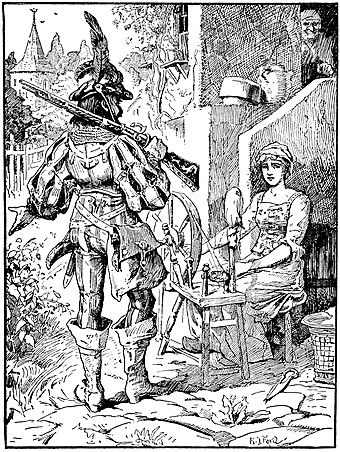
THE NETTLE SPINNER
Another dark fairy tale: this is a Flemish story, 'La Fileuse d’Orties', from ‘Contes du roi Cambrinus’ (1872) collected by Charles Deulin. The English translation was made by Leonora Blanche Alleyne (Mrs Andrew Lang) for ‘The Red Fairy Book’, and it's a strange, sinister story which takes the old theme of the girl who weaves nettle shirts, and stands it on its head. You'll remember tales such as Hans Andersen's 'The Wild Swans' and the Grimms’ ‘The Twelve Brothers’ in which the heroine spins and weaves nettle shirts to disenchant the brothers she loves. (A similar healing magic is performed by 'Gilla of the Enchantments': #6 in this series.) But when the heroine of this story tells a wicked count that she prefers marrying her sweetheart to succumbing to his wiles, the count effectively responds, ‘Over my dead body!’ and orders her to perform what he assumes will be the impossible tasks of weaving a nettle wedding-gown for herself, and for himself, a nettle shroud. Of course it isn't impossible, and as she steadily spins the nettles and weaves the shroud, he begins to sicken…
Renelde is one of those strong, long-persisting heroines who keep their eyes firmly fixed on what they've decided is right. You'll note that while the women in this story are active agents, the men are ultimately ineffectual. Neither the count nor Renelde's fiance Guilbert can persuade her to act differently from her principles. Her behaviour is so consistent and so quietly inexorable that one almost begins to feel sympathy for the wicked count.
Almost. Not quite.
I
Once upon a time there lived at Quesnoy in Flanders a great lord whose name was Burchard, but whom the country people called Burchard the Wolf. Now Burchard had such a wicked, cruel heart that it was whispered he used to harness his peasants to the plough and force them by blows from a whip to till his land with naked feet.
His wife, on the other hand, was always tender and pitiful to the poor and miserable. Every time she heard of another of his misdeeds, she would secretly go to repair the evil, so that she was blessed throughout the whole countryside. This countess was loved as much as the count was hated.
II
One day when he was out hunting the count passed through a forest and at the door of a lonely cottage he saw a beautiful girl spinning hemp. “What is your name?” he asked. “Renelde, my lord.” “Aren’t you tired of living in such a lonely place?” “I’m used to it my lord, and I never get tired of it.” “If you come to the castle, I’ll make you a lady’s maid to the countess.” “I can’t do that, my lord. I have to take care of my grandmother, who is very helpless.”
“Come to the castle, I tell you. Be there this evening,” and he went on his way. But Renelde knew very well not to trust him, and she was betrothed to a young woodcutter called Guilbert, and besides, she did have her grandmother to look after.
Three days later the count rode by again. “Why didn’t you come?” he asked the pretty spinner.
“I told you, my lord, I have to look after my grandmother.”
“Come tomorrow and I will make you lady-in-waiting to the countess,” and he went on his way. But his offer had no more effect than the last, and Renelde did not go to the castle. “If you will just come,” said the count, the next time he rode by, “I will put the countess aside and marry you.” But two years before when Renelde’s mother was dying of a long illness, the countess had helped them and been very kind to them, so even if the count had really meant to marry Renelde, she would still have refused.
III
A few weeks passed, and Renelde hoped she had got rid of him, but one day the count stopped at the door, his duck-gun under one arm and his game-bag on his shoulder. This time Renelde was spinning not hemp, but flax.
“What’s that you’re spinning?” he asked roughly. “My wedding shift, my lord.” “You’re going to be married, are you?” “Yes my lord, by your leave.” For at that time no peasant could marry without his master’s permission.
“I will give you leave on one condition. Do you see those tall nettles that grow on the graves in the churchyard? Go and gather them, and spin them into two fine shifts. One shall be your bridal gown, and the other shall be my shroud, for you shall be married the day I am laid in my grave.” And with a mocking laugh, the count turned away.
Renelde trembled. No one in all Locquignol had heard of such a thing as spinning nettles. And besides, the count seemed made of iron and was very proud of his strength, often boasting that he should live to be a hundred.
Every evening when his work was done, Guilbert came to visit his bride-to-be; this evening he came as usual, and Renelde told him what Burchard had said.
“Shall I watch for the Wolf and split his skull with a blow of my axe?”
“No!” Renelde answered, “there must be no blood upon our bridal. And – we must not hurt the count. Remember how good the countess was to my mother.”
An old, old woman now spoke up, she was the mother of Renelde’s grandmother, and was more than ninety years old. All day long she sat in her chair nodding her head and never saying a word. “My children,” she said now, “in all the years I have lived, I have never heard of a shift spun from nettles. But what God demands of us, we will have the strength to do. Why shouldn’t Renelde try it?”
IV
Renelde did, and to her great surprise found the nettles, crushed and prepared, gave a good thread, supple and light and firm. Quite soon she had finished the first shift, which was for her wedding. She wove it and cut it out at once, hoping the count would not force her to begin the other. Just as she finished sewing it, Burchard the Wolf passed by.
“Well,” said he, “how are the shifts getting on?”
“Here is my wedding gown, my lord, “ Renelde answered, holding up the shift, which was the whitest and finest ever seen. The count went pale, but he replied roughly, “Very good. Now begin the other.”
The spinner set to work. As the count returned to the castle a cold shiver passed over him; he felt, as the saying goes, that someone had walked over his grave. He tried to eat his supper but could not; he went to bed shaking with fever. He did not sleep, and in the morning he could not rise.
Such a sudden illness, which was becoming worse, made him very uneasy. He was sure Renelde’s spinning wheel was doing it. Was it necessay that his body, as well as his shroud, should be ready for burial? So Burchard sent a message to Renelde to stop spinning and put away her wheel. She obeyed, but that evening Guilbert asked her, “Has the count agreed to our marriage?”
“No,” said Renelde. “Continue your work, sweetheart. It’s the only way of gaining his consent. He told you so himself."
V
Next morning, the girl sat down to spin. Two hours later, two soldiers arrived and when they saw her spinning they seized her, tied her arms and legs and carried her to the river, which was swollen with rain. They flung her in like a dog and left her to drown. But Renelde rose to the surface, her bonds fell away and she struggled to land.
As soon as she got home she sat down and began to spin.
Again the soldiers came to the cottage and seized her. They carried her to the river, tied a stone around her neck and threw her into the water. But the moment their backs were turned the stone untied itself. Renelde waded to the ford, returned to the hut and sat down to spin.
Now the count resolved to go to Locquignol himself, but he was so weak he had to be carried in a littler. And still the spinner spun. As soon as he saw her he fired a shot at her, but the bullet rebounded without hurting her – and still she spun on.
Burchard fell into such a rage it almost killed him. He smashed the spinning wheel into a thousand pieces and fell to the ground in a faint. He was carried back to the castle unconscious, but the next day the spinning wheel was mended and the spinner sat down to spin. The count ordered her hands to be tied, but the cords fell away. He ordered every nettle to be uprooted for miles around, but no sooner had they been torn from the soil than they grew again thicker than before, and they even grew up through the cottage floor and sprang to the distaff ready for spinning.
And every day Burchard the Wolf grew worse and watched his end approaching.
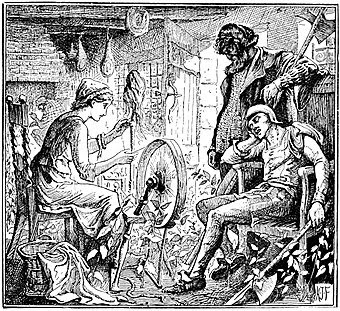
VI
Moved by pity for her husband, the countess at last found out the cause of his illness, and begged him to consent to Renelde’s marriage. But the count in his pride refused more than ever to do so.
So without his knowledge the lady went herself to pray for mercy from the spinner, and in the name of the girl’s dead mother she begged her to spin no more. Renelde gave her promise, but in the evening Guilbert arrived at the cottage, and seeing no progress in the cloth from the day before, he asked the reason. Renelde confessed that the countess had pleaded for her husband’s life.
“Has he agreed to our marriage?” “No.” “Let him die, then. The countess will understand that it is not your fault. The count alone is guilty of his own death.” “Let us wait a little. Perhaps his heart may soften.”
They waited for one month, for two, for six, a year. The spinner spun no more. The count had ceased to persecute her, but still he refused his consent to the marriage. Guilbert became impatient. “Let us have done with it!” he cried.
“Wait a little still,” pleaded Renelde, but the young man grew weary. He came more rarely to Locquignol, and then he did not come at all. News came that he had left the country. Renelde felt her heart would break, but she held firm and another year went by.
VII
Then the count became more ill. The countess thought Renelde, tired of waiting, ahd begun her spinning again, but when she came to the cottage to find out, the wheel stood silent in the corner.
But the count grew worse and worse. The doctors had given him up, the passing bell was rung and he lay expecting Death to come for him. But Death was not so near as the doctors thought, and still he lingered, getting neither better nor worse. He could neither live nor die; he suffered horribly and called aloud on Death to put an end to his pains.
In this extremity he remembered what he had said to the little spinner long ago. If Death was so slow in coming it was because he was not ready to follow him, having nor shroud for his burial.
He sent for Renelde, placed her by his bedside and ordered her at once to go on spinning his shroud, and as soon as she began the count felt his pain begin to lessen. At last his heart melted and he was sorry for all the evil he had done in his pride, and he begged Renelde to forgive him. So she forgave him, and went on spinning night and day.
When the thread was all spun she wove it with her shuttle, and then she cut the shroud and began to sew it. And as she sewed the count felt the life sinking within him, and when the needle made the last stitch he gave his last breath. VIII
At that same hour Guilbert returned to the country. He had never stopped loving Renelde, and eight days later they were married. He had lost two years of happiness, but comforted himself by thinking that his wife was a clever spinner – and what was far better, a brave and good woman.
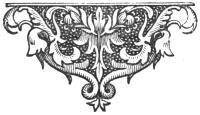
More on fairy tales and folklore in "Seven Miles of Steel Thistles" available here and here.
Picture credits:Illustrations to The Nettle Spinner by HJ Fordfor The Red Fairy Book
Published on May 19, 2020 03:14
May 12, 2020
Strong Fairytale Heroines #12: THE WOMAN WHO WENT TO HELL
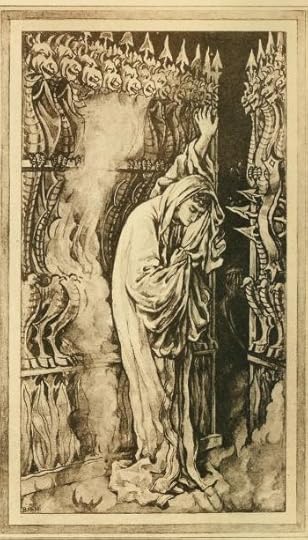
The next three fairy tales in the series take a darker turn. This story of a young woman who goes down into the underworld to save her lover was narrated in Gaelic some time around 1885 by Patrick Minahan, of Malinmore, Glencolumkill, Co. Donegal, to William Larminie who translated and published it in ‘West Irish Folk-Tales’, (Camden Library, 1893). Larminie - one of those excellent 19th century collectors who named and respected their oral sources - says of Minahan: “I obtained more stories from him than from any other one man. He said he was eighty years old; but he was in full possession of all his faculties. He also had a holding on which he still worked industriously. … His style, with its short, abrupt sentences, is always remarkable, and at its best I think excellent.”
Of the tale itself, Larminie has only this to say, but it’s to the point: “This touching tale has a curious far-away resemblance to certain classical legends. A good deal must [have been] lost, and in consequence the long struggle of the young man with the devil has much that requires explanation. It is unique among Celtic stories.”
I can’t be sure what classical stories Larminie had in mind – Persephone’s sojourn in Hades, perhaps, for it’s not really the young man’s struggle so much as that of the young woman who becomes his wife! Myself, I'd like to note that the restorative fire in which the dead man asks the young woman to burn him to ashes reminds me of the fire of roses in George Macdonald's 'The Princess and Curdie' – and that her return home, worn and almost unrecognisable, reminds me of the return of Homer's Odysseus.
The story begins when the devil tricks a woman into promising him her 'burden', which she assumes means the cabbages she is carrying. In fact it is her unborn son. The boy is born, grows up and dies suddenly aged 18. When a young woman enters the chapel where his body lies coffined, the dead young man arises and persuades her to help him. By burning his corpse she restores him to a kind of spirit life, and he sires a son on her. But the devil claims him - unless someone else will go to Hell in his place. His lover volunteers.
The young woman's descent into Hell and her subsequent ascent reminds me of a story older even than Homer's - that of Inanna of Sumer, Queen of Heaven and Earth, the goddess of love and of the morning and evening star, whose descent to the realm of Ereshkigal Queen of the Dead is chronicled on clay tablets dating back to 2000 BCE.
In summary, it goes like this: Inanna abandons her temples and palaces in heaven and earth and goes down to the underworld. Her journey seems to be a rite of passage rather than an attempt to rescue a friend or lover such as those of Gilgamesh and Orpheus. In order to pass through the underworld’s seven gates she must relinquish at each one a part of her 'mes' (roughly her power), signified by regalia of crown, beads, robe, ring, breastplate, measuring rod and line. At last, naked and powerless she enters the throne room of Ereshkigal where the goddess strikes her dead and hangs her body – now nothing but ‘a piece of rotting meat’ – from a stake. But, following Inanna’s previous orders, her faithful servant Ninshibur persuades Enki, god of wisdom, to save her. He creates two sexless creatures from the dirt under his fingernails, furnishes them with the food and water of life, and sends them to the underworld to ask for Inanna’s corpse. Sprinkling the corpse with the food and water, the creatures restore it to life, but the judges of the underworld decree another must take her place. As Inanna ascends, the 'galla' or small demons of the underworld cling to her side and rise with her. They ‘know not food, they know not water, they know not sprinkled flour,’ but their purpose is to seize and bring back the one who will die for her. Her loving servant Ninshibur and her own sons offer themselves, but Inanna refuses to give them up. She chooses instead her husband Dumuzi, who has not even risen from his throne to welcome her home! Dumuzi is taken to the underworld. After his death, Inanna weeps for him, and later in the tale she allows his faithful sister to take his place for six months of every year.
This myth has cast a long shadow. Sumerian Inanna and Dumuzi became the Akkadian Ishtar and Tammuz, and the Egyptian goddess Isis perhaps shares some of Inanna’s attributes. It predates the Greek myth of Persephone and Hades, first noted in Hesiod's Theogony, by one and a half millennia. Now, obviously there can't be any direct connection, but I feel there’s still a faint trace of it in this Irish story – in the young woman’s voluntary descent, and in the touching moment when the lost souls cling to her, clotted in her hair.
There was a woman coming out of her garden with an apron-full of cabbage. A man met her. He asked her what she would take for her burden. She said it was not worth a great deal, she would give it to him for nothing. He said he would not take it, but would buy it. She said she would only take sixpence. He gave her the sixpence, and she threw the cabbage towards him. He said that was not what he had bought, but the burden she was carrying. Who was there but the devil? She was troubled then.
She went home and she was weeping. It was a short time till her young son was born, and he was growing till he was eighteen years old. Then he was out one day and fell, and never rose up till he died. When they were going to bury him, they took him to the chapel and left him there till morning.
There was a man among the neighbours who had three daughters. He took out a box of snuff to give the men a pinch, and the last man to whom the box went round left it on the altar. They all went home, and when the man was going to bed he looked for his box. The box was not to be got; it was left behind in the chapel. He said he could not sleep that night without a pinch of snuff. He asked one of his daughters to go to the chapel and bring him the box that was on the altar. She said there was loneliness on her. He cried to the second girl, would she go? She said she would not go, that she was lonely. He cried to the third, would she go? And she said she would go, that there would be no loneliness on her in the presence of the dead.
She went to the chapel, she found the box, she put it in her pocket. When she was coming away she saw a ring at the end of the coffin. She caught hold of it till it came to her. The end came from the coffin. The man that was dead came out. He begged her not to be afraid.
“Do you see that fire over yonder? If you are able, carry me to that fire.” “I am not able,” said she. “Be dragging me along with you as well as you can.”
She put him on her back. She dragged him till they came to the fire. “Draw out the fire,” said he, “and put me lying in the middle of it; fix up the fire over me. Anything of me that is not burnt, put the fire on it again.”
He was burning till he was all burnt. When the day was coming she was troubled on account of what she had seen in the night, and when the day grew clear there came a young man, who began making fun with her.
“I have not much mind for fun on account of what I have seen during the night.” “Well, it was I who was there,” said the young man. “I would go to heaven if I could get an angel made by you left in my father’s room.”
Three quarters of a year from that night she dressed herself up as if she was a poor woman. She went to his father’s house, and asked for lodging till morning. The woman of the house [the young man's mother] said that they were not giving lodging to any poor person at all.
She said she would not ask for more than a seat by the fire. The man of the house told her to stay till morning. They both went to lie down. She sat by the fire. In the course of the night she went into the room and there she had a young son. Her husband came in at the window in the shape of a white dove. He dressed the child, the child began to cry, and the woman of the house heard the crying. She rose to get out of her bed. Her husband told her to lie quiet and have patience. She got up in spite of him. The door of the room was shut. She looked in through the keyhole and saw him standing on the floor; she perceived it was her son who was there. She cried to him, was it he that was there? He said it was.
“One glance of your eye has sent me for seven years to hell.”“I will go myself in your place,” said his mother.
She went then to hell. When she came to the gate, there came out steam so hot that she was burned and scalded, and had to return. “Well,” said the father, “I will go in your place.” He had to return too. The young man began to weep. He said he must go himself, but the mother of the child said she would go.
“Here is a ring for you,” said he. “When thirst comes on you, or hunger, put the ring in your mouth; you will feel neither thirst nor hunger. This is the work that will be on you – to keep down the souls: they are stewing and burning in the boiler. Do not eat a bit of food there. There is a barrel in the corner, and all the food that you are given, throw into the barrel.”
She went to hell then. She was keeping down the souls in the boiler. They were rising in leaps out of it. All the food she got she threw on the barrel till the seven years were over. She was making ready to be going then. The devil came to her; he said she could not go yet awhile till she had paid for the food she had eaten. She said she had not eaten one morsel of his: “All that I got, it is in the barrel.” The devil went to the barrel, and all that he had given her was there for him.
“How much will you take to stay seven years more?”“Oh, I am long enough with you,” said she; “if you give me all that I can carry, I can stay with you.”
He said he would give it. She stopped. She was keeping down the souls during seven more years, she was shortening the time as well as she could till the seven years were ended. Then she was going. When the souls saw her going they rose up with one cry, lest one of them should be left. They went clinging to her; they were hanging to her hair, all that were in the boiler. She moved on with her burden.
She had not gone far when a lady in a carriage met her.“Oh! great is your burden,” said the lady, “will you give it to me?”“Who are you?” said she. “I am the Virgin Mary.”“I will not give it to you.”
She moved on with herself. She had not gone far when a gentleman met her. “Great is your burden, my poor woman’; will you give it to me?”“Who are you?” said she“I am God,” said he.“I will not give my burden to you.”
She went on with herself another while. Another gentleman met her. “Great is the burden you have,” said the gentleman; “will you give it to me?”“Who are you?” said she.“I am the King of Sunday,” said he.“I will give my burden to you,” said she. “No rest had I ever in hell except on Sunday.” “Well, it is a good woman you are; the first lady you met, it was the devil was there; the second person you met, it was the devil was there, trying if they could get your burden from you back. Now,” said God, “the man for whom you have done all this is going to be married tomorrow. He thought you were lost since you were in that place so long. You will know nothing till you are at home.”
She knew nothing till she was at home. The house was full of drinking and music. She went to the fire. Her own son came up to her.
She was making him wonder, she was so worn and wasted. She told the child to go to his father and get a glass of whisky for her to drink. The child went crying to look for his father. He asked his father to give him a glass of whisky. His father gave it. He came down where she was by the fire. He gave her the glass. She drank it, there was so much thirst on her. The rinf that her husband gave her she put in the glass.
“Put your hand over the mouth of the glass; give it to no one at all till you hand it to your father.”
The lad went to his father. He gave him the glass, The father looked into it, and saw the ring. He recognised the ring.
“Who has given you this?” said he.“A poor woman by the fire,” said the lad.
The father raised the child on his shoulder that he might point out to him the woman who had given him the ring. The child came to the poor woman. “That is the woman,” said he, “who gave me the ring.”
The man recognised her then. He said that hardly did he know her when she came so worn and wasted. He said to all the people that he would never marry any woman but this one; that she had done everything for him; that his mother sold him to the devil, and the woman had earned him back; that she had spent fourteen years in hell, and now she had returned
This is a true story. They are all lies but this one.
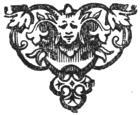
More on William Larminie's "West Irish Folk-Tales" in my book of essays on folklore and fairytales, "Seven Miles of Steel Thistles"
Picture credits: The Woman Who Went To Hell - (artist unknown) frontispiece to "The Woman Who Went To Hell: and other ballad and lyrics" by Dora Sigerson (Mrs Clement Shorter), De la More Press, 1902
Published on May 12, 2020 02:47
May 5, 2020
Strong Fairy Tale Heroines #11: FUNDEVOGEL

FUNDEVOGEL, or BIRD-FOUNDLING
This sweet story is one of the Grimms’ ‘Children’s and Household Tales’. translated by Margaret Hunt in 1884. The Grimms note that it comes “from the district of Schwalm in Hesse. It is also told that the cook was the wicked wife of the forester, and the question and answer are differently given: for instance, ‘You should have gathered the rose and the bush would have followed you.”’ Like 'The Mastermaid', this tale is is Aarne–Thompson type 313A, 'the girl helps the hero flee' - which I reckon ought to be renamed 'the heroine rescues the boy'!
It’s a simple but satisfying tale: Lina, who has magical skills, is the boy’s foster sister and he her adopted brother. The pair are only children, but the tenderly repeated refrain, ‘Never leave me and I will never leave you’ suggests they may marry later on, as happens in another of the Grimms’ tales, ‘Sweetheart Roland’, to which it is related. This type of tale is very different from those darker stories in which sisters endure hardship and suffering for the sake of their brothers.
The extorted promise with which the wicked cook binds little Lina is a standard feature, as is the wickedness of the cook in the first place (fairy tales are built of standard features - we accept them as we accept the construction of a sonnet), but in this story the bond between the children proves stronger than the promise.
There was once a forester who went into the forest to hunt, and as he entered it he heard a sound of screaming, as if a little child were there. He followed the sound and it led him to a high tree, and at the top of this tree a little child was sitting – for a bird of prey had seen it, flown down and snatched it away, and dropped it into the tree.
The forester climbed up and brought the child down. He thought, “I’ll take him home, and he shall grow up with our Lina.” So he took it home and the two children grew up together, and they named the boy who was found in the tree Fundevogel, since a bird had carried him away. And Fundevogel and Lina loved each other dearly.
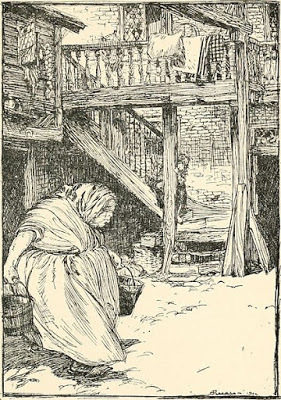
Now the forester employed an old woman to cook for him. One evening she took two pails and kept going back and forth to the brook, fetching more and more water. Lina saw this and asked, “Old Sanna, why are you fetching so much water?”
“If you will never repeat it to anyone, I will tell you.” So Lina said no, she would never repeat it to anyone, and then the cook said, “Tomorrow morning when the forester is out hunting I will heat the water, and when it is boiling, I will throw Fundevogel in, and boil him to death.”
Early next morning the forester got up and went out hunting while the children were still in bed. Then Lina said to Fundevogel, “If you will never leave me, I will never leave you.” Fundevogel said, “Never will I leave you – not now, nor ever!” Then said Lina, “Then I will tell you. Last night old Sanna carried so many buckets of water into the house that I asked her why she was doing it, and she said that she would tell me, if I promised not to tell anyone, so I promised, and she said that early in the morning when father was out hunting, she would boil the water in the big kettle and throw you in. So let us get up quickly, dress, and go away together.”
So the children dressed themselves quickly and went away. When the water in the kettle was boiling, the cook went to the bedroom to find Fundevogel, but both the children were gone. The cook was now terribly alarmed. “What shall I say now when the forester comes back?” she said to herself. “The children must be caught and brought back home,” and she sent three servants running after them.

When the children looked back from the edge of the forest and saw the three servants running after them, Lina said to Fundevogel, “Never leave me and I will never leave you.” Fundevogel said, “Neither now, nor ever will I leave you.” Lina said, “Then you shall become a rose tree and I the rose upon it.”
When the servants came to the forest, there was nothing to be seen but a rose tree with one rose on it; the children were nowhere. “Nothing to be done here,” said they, and returned to the old cook and told her they had seen nothing but a rose tree with a single rose.
How the cook scolded! “You simpletons! You should have cut the rose bush in half and broken the rose off and brought it to me: go and do it at once!”
Off went the servants for a second time, but again the children saw them coming. Lina said, “Fundevogel, never leave me and I will never leave you.” “Neither now, nor ever,” said Fundevogel, and Lina said, “Now you shall become a church, and I’ll be the chandelier in it.”
So when the three servants came, nothing was to be seen but a church with a fine chandelier hanging inside it. “What can we do here?” they said to each other. “We will have to go home.” So they went home, and told the cook they had seen nothing but a church with a chandelier in it. “Fools!” scolded the cook. “You should have knocked the church to pieces and pulled down the chandelier and brought it back with you.” And now the old cook herself set off with the three servants in pursuit of the children.
When the children looked back this time and saw the old cook waddling after them, Lina said, “Fundevogel, never leave me and I will never leave you.” And Fundevogel said, “Neither now, nor ever!” Then said Lina, “You shall be a fishpond and I will be the duck on it.”
Well, the old cook caught up with them, and she saw the pond, and lay down beside it so that she could drink it all dry. But the duck swam smartly up to her. It seized her head in its beak and pulled her into the water, and there the old witch was drowned. Then the children were heartily delighted and went home together, and if they have not died they are living there still.
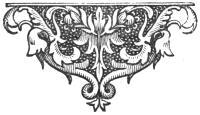
More on fairy tales and folklore in "Seven Miles of Steel Thistles" available at these links: here and here.
Picture credits:
Fundevogel - the child in the tree - by Mercer MayerFundevogel: The cook goes back and forth to the well: Arthur Rackham
Fundevogel - The children see the three servants - Artist unknown
Published on May 05, 2020 02:43
April 28, 2020
Strong Fairy Tale Heroines #10: WHUPPITY STOORIE
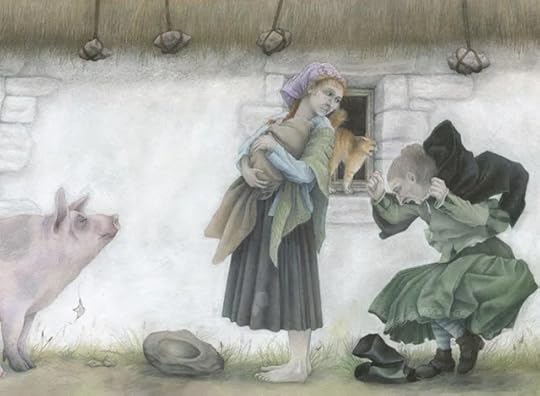 Illustration by Kate Leiper: www.kateleiper.co.uk/Instagram:kate_leiper_artist
Illustration by Kate Leiper: www.kateleiper.co.uk/Instagram:kate_leiper_artistThis Scottish tale is included in Robert Chambers’ ‘Popular Rhymes of Scotland’ (1841 edition) and comes from the manuscript of Chambers’ friend Charles K. Sharpe. It’s presented as if narrated by one ‘Nurse Jennie’ of Annandale whose Lowland Scots tongue is so vivid and racy (whether she actually existed or not!) that it would be a shame to anglicize it. So I have simply added a variety of explanatory notes, some within the text and some footnotes. I'm sure we Sassenachs can manage!
The heroine of the story is ‘the goodwife o’ Kittelrumpit’. The narrator suggests this place may be situated “somewhere amang the Debatable Ground”. In fact I think it’s a joke, a made-up name with a comic and mildly rude meaning;‘Tickle-arse’ would be my best bet, though I’m no Scots scholar, so if anyone knows better, do let me know. The Debatable Ground does exist: it is the much fought-over area between Scotland and England which, in the 16th century, was the haunt of the Border Reivers.
The tale is one of the many variants of the Rumpelstiltskin story, but a lot funnier and livelier. The goodwife and the green fairy woman are splendidly-matched antagonists – two energetic, determined women with sharp tongues in their heads: but the goodwife wins hands down when she turns the tables on her foe. The lovely illustration is by Scottish artist Kate Leiper and you can see more of her beautiful work by clicking the link below the picture: also here: http://kateleiper.co.uk/
The story begins when the goodwife’s husband goes off to the fair one day and never comes back: he was “a vaguing sort of body” anyway and not to be depended upon. Left to fend for herself – “A’body said they were sorry for her but naebody helpit her, whilk’s a common case, sirs,” – she has nothing left but her cottage – a “sookin’ lad bairn” (that's a baby boy still at the breast) – and her pride and joy, a “soo” (sow) which is about to give birth to piglets. If all goes well, the goodwife’s stock will be much increased. But one day she goes to the pigsty to fill the sow’s trough, and shock! horror! what should she find but the sow “lying on her back, grunting and groaning and ready to gie up the ghost”?
Read on!

I trow this was a new stoon [blow] to the goodwife’s heart; she sat doon on the knocking-stane
Noo, the cot-hoose of Kittlerumpit was built on a brae
Aweel, when the goodwife saw the green gentlewoman near her, she rose and made a curtsie; and “Madam,” quo’ she, weeping, “I’m the maist misfortunate woman alive.”
“I dinna wish to hear pipers’ news and fiddlers’ tales,” quo’ the green woman. “I ken ye’ve lost your goodman – we had waur losses at the Shirra Muir
“Onything your leddyship’s madam likes,” quo’ the witless goodwife, never guessing who she had to deal with.
“Let’s wet thumbs on that bargain
She glowers at the soo for a lang time, and then begins to mutter to herself what the goodwife couldna well understand; it soundit like “Pitter patter, Haly watter.” Then she took oot of her pouch a wee bottle wi’ something like oil in it, and rubs the soo with it around the snout, behind the lugs and on the tip o’ the tail. “Get up, beast,” quo’ the green woman, and nae sooner said than done – up bangs the soo wi’ a grunt and awa’ to her trough for her breakfast.
The goodwife o’ Kittelrumpit was a joyful goodwife noo, and wad hae kissed the very hem o’ the green madam’s gown-tail, but she wadna let her. “I’m no fond o’ demonstrations,” said she, “noo that I hae righted your sick beast, let’s finish our bargain. Ye’ll no find me an unreasonable, greedy body – I like aye to do a good turn for a small reward – all I ask, and will have, is that lad bairn in your bosom.”
The goodwife o’ Kittelrumpit let oot a skirl like a stickit gryse [stuck piglet]. The green woman was a fairy, nae doubt of it, so she prays and weeps and kneels and begs and flytes, but it wouldna do. “Ye may spare your din,” quo’ the fairy, “skirling as if I was a deaf as a doornail; but this I’ll tell ye – by the law we live on, I canna take your bairn till the third day after this; and no then, if ye can tell me my right name.” And off gaes madam around the pigsty end, and the goodwife falls down in a swoon behind the knocking-stane.
Aweel, the goodwife couldna sleep that night for weeping and a’ the next day the same, cuddling her bairn till she near squeezed its breath out; but the second day she thinks o’ taking a walk in the wood, and wi’ the bairn in her arms she sets out and gaes far in amang the trees where there was an old quarry hole grown o’er wi’ gorse, and a bonny spring well in the middle of it. Before she came very nigh, she hears the birring of a lint-wheel [a wheel for spinning flax], and a voice lilting a sang; sae the wife creeps quietly amang the bushes, and keeks [peeps] ower the brow of the quarry, and what does she see but the green fairy kemping at her wheel and singing:
“Little kens our good dame at hameThat Whuppitie Stoorie is my name!”
“Ah ha!” thinks the wife. “I’ve gotten the mason’s word at last: the de’il gie them joy that tell’t it!” And she gaed hame far lichter than she came out, as you may guess, laughing like a madcap wi’ the thought of begunkin [befooling] the auld green fairy.
Aweel, ye must ken that this goodwife was a jocular woman and aye merry when her heart wasna sair overladen, sae she thinks to have some sport wi’ the fairy: and at the appointit time she puts the bairn behind the knocking-stane and sits down on it hersel’. Syne she pulls her nightcap ajee [awry] ower her left lug [ear], crooks her mouth on t’ither side, as if she were weeping – and a filthy face she made, ye may be sure. She hadna lang to wait, for up the brae mounts the green fairy, neither lame nor lazy, and lang afore she got near the knocking-stane, she skirls out,
“Goodwife o’ Kittelrumpit, ye ken weel what I come for – stand and deliver!”
The wife pretends to greet sairer [weep more sorely] than before, and wrings her nieves [fists], and falls on her knees, wi’: “Och, sweet madam mistress, spare my only bairn and take the weary soo!”
“The de’il take the soo, for my share,” quo’ the fairy. “I come na here for swine’s flesh. Dinna be contramawcious, hizzie [hussy, wench], but gie me the gett [child; begotten] instantly!”
“Ochone, dear leddy mine,” quo’ the goodwife, “forbear my poor bairn and take mysel’!”
“The de’il’s in the daft jade,” quo the fairy, looking like the far-end o’ a fiddle
I trow this set up the wife o’ Kittelrumpit’s birse [put up her hackles]; for though she had two bleared een and a lang red neb [nose] forbye, she thought hersel’ as bonny as the best o’ them. Sae she bangs aff her knees, sets her nightcap
Gin a fluff o’ gunpowder had come out o’ the ground, it couldna hae made the fairy loup [leap] higher than she did; then down she came again, thump on her shoe-heels, and whirling around, she ran down the brae, screeching for rage like an owlet chased wi’ the witches.
The goodwife o’ Kittelrumpit laughed till she was like to ryve [split]; then she takes up her bairn and goes into her hoose, singing all the way;
A goo and a gitty, my bonny wee tyke,Ye’s noo hae your four-oories;Sin’ we’ve gi’en Nick a bane to pykeWi’ his wheels and his Whuppity Stoories.”
Published on April 28, 2020 02:34
April 21, 2020
Strong Fairy Tale Heroines #9: EDERLAND THE POULTRY-MAID

This light-hearted story comes from 'Danish Fairy Tales', collected by Svendt Grundtvig, (1824-1883) and is a good follow up to last week's tough Cinderella, employing several of the same motifs to very different effect. A dying mother leaves most of her possessions to her two eldest daughters, gifting the youngest, little Ederland, with nothing but a dough pan, an apron and a broom. Her sisters deride her, telling her that their mother thought nothing of her, but Ederland holds fast to a belief in her mother's love. When her sisters make further difficulties for her, she visits her mother's grave - again like Cinderella - where her faith in her mother is upheld, and her apparently poor legacy turns out to be the very thing that makes her fortune.
Buoyed by her mother's advice, Ederland sets off on her adventures. With cheerful élan she tricks a family of trolls and wrests three precious things from them, one of which - the pig that never diminishes no matter how much bacon is sliced from it - perhaps hails back to the boar Sæhrímnir on which the Norse gods feast nightly in Valhallr (besides irresistably reminding me of the Dish of the Day in Douglas Adams' 'The Restaurant at the End of the Universe': see link here.) Ederland's marriage to a distinctly selfish master ('You could easily do it if you wanted to!' he keeps moaning) is the traditional fairy tale coda, denoting her worldly success. Fairy tales are almost never romances.
I hope you'll agree with me that Ederland is another tough cookie. Just don't feel too sorry for the trolls!
Once upon a time there was a woman who had three daughters. She was very ill and she expected to hear death knock at her door from day to day; so she called together her three daughters and divided what she had among them. But she did not make an equal division: she gave the two older daughters, who were always nice to look at, and kept themselves well dressed, all that she had; and the youngest, little Ederland, received only a dough-pan, a broom-stick and an apron.
The mother lived but a short time, and when she had died, what she had left was divided between her children as she had arranged. Then the two older sisters said to Ederland, "That shows you once more, Ederland, that our mother thought more of us than she did of you, for all she gave you was that wretched dough-pan, and the broom-stick and apron."
But little Ederland was patient, and held her tongue, and still believed that her mother had loved her just as much as she had her two sisters.
In the course of time all three sisters took service in a fine house. The two older sisters were in the house itself, and helped with all the housework; but little Ederland was only the poultry-maid. Yet before long the master of the house noticed that his poultry had never been in better condition than since Ederland had taken charge; and therefore he praised her continually in her sisters' presence.They did not enjoy hearing it at all. At last they decided to tell their master that Ederland could do much more, if only she felt like it. They knew positively, that she could get him a candlestick that would give light without a candle; and if she said she could not, it merely showed that she would not.
When their master heard this, he at once sent for Ederland and said to her, "I hear that you can get me a candlestick that gives light without a candle. I want to have it very much, and you must get it for me. It is useless for you to refuse, for I know that you can if you feel like it."
Little Ederland cried, and said she would like to oblige him if only she knew how; but that he had set her a task she really could not accomplish. Yet her master would not believe her.
"All your speeches won't help you," he said. "You must get the candlestick for me, but you shall have two bushels of gold for getting it!"
Little Ederland left the house in tears, and went straight to her mother's grave. As she stood there and cried, her mother rose from the grave and said, "Do not cry! Go back home, and ask your master for two bushels of salt, take your broomstick, set it up as a mast in the dough-pan, tie your apron to it for a sail, and sail out to sea with your two bushels of salt. Then you will come to the place where you can get the candlestick that gives light without a candle!"
And with that the mother sank back into her grave, and little Ederland went home and asked her master for the two bushels of salt. She got them, and then set up her dough-pan with the broom-stick for a mast, and the apron for a sail, took her two bushels of salt, and sailed out on the stormy sea, letting the waves carry her along as they chose.
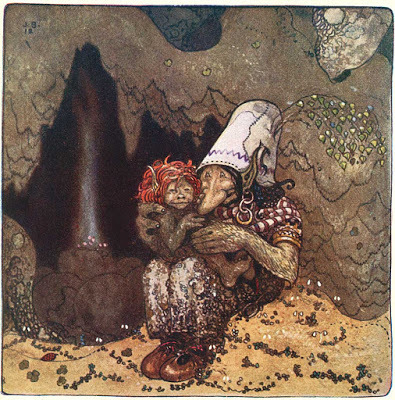
She sailed a long way, but at last she landed on the island of the trolls, and went ashore with the two bushels of salt. Somewhere about she saw a house. She went up to it, climbed on the roof, and looked down the chimney. Down below stood the old troll mother, cooking mush for her sons. On the hearth, beside the kettle of mush, stood the candlestick that gave light without a candle. This was just what Ederland wanted, and when the old troll mother turned her back, she poured down her two bushels of salt into the mush. The old troll mother turned right around again, and tasted the mush; but it was terribly salty. So she took up a bucket to get some water to cook over the mush. Then Ederland slipped down the chimney in a trice and ran after her, and as the old troll mother was stooping over the edge of the well to draw up the bucket, Ederland gave her a push so that she fell in head over heels, and did not come up again. Ederland now quickly secured the candlestick and ran down to her ship. She was no more than a short distance from land, when she saw the trolls come home, and a moment later they ran down to the strand and called after her, "Ederland, Ederland! You have thrown our mother into the well and taken our candlestick! If you ever come here again you will have to pay the price!"
But Ederland called back, "Well, I am coming back twice!" and sailed gaily home.
Her master was filled with joy when he saw the candlestick that gave light without a candle, and little Ederland received her two bushels of gold and was happy as well. But her two sisters grew more angry with each passing day at her good fortune, and their only thought was of how they might mar her pleasure. At last they again told their master that Ederland could do much more if she only would. She could get a horse with bells on all four legs, one that could be heard long before it was seen, and that could be found again, no matter how far it had strayed. Their master would much rather have had a horse of that kind even than the candlestick he already possessed. He had Ederland called at once, and told her that he was well aware that she could obtain a horse that had bells on all four of its legs, which one could hear in the distance, and could always find if it strayed. She must get him that horse! Ederland cried and said she was only too willing to get it, but she did not know how. Yet her master would not content himself with her answer.
"You could, if you only would," he said. "You must get that horse for me and I will give you three bushels of gold for it."
Again Ederland went to her mother's grave and cried, and was very unhappy. And again her mother rose from the grave and said to her, "Do not cry, my little Ederland! Go home and ask your master for four bunches of tow, take them and sit down in your dough-pan with the broomstick and the apron as before. Then you will reach the place where you can obtain the horse with the bells on all four legs."
Thereupon her mother sank back into the grave; while little Ederland went home and asked her master for the four bunches of tow. He gave them to her at once, and she sailed out to sea in her dough pan, with the broomstick for a mast, and her apron for a sail. This time she also landed on the island of the trolls.
It was just at the time when the trolls were at home, and were eating their dinner, and the horse with the bells on all four legs was grazing in the field before the house. Ederland slipped up to him, tied a bunch of tow around each leg, so that the bells could not ring, and led him down to the strand. Just as she was leading him into the boat, however, the bunch of tow about one of his legs fell off, the bell at once began to ring, and all the trolls hurried down to the strand. Little Ederland had led the horse safely aboard, and had just put a bit of water between the boat and the shore, when the trolls reached the beach. They fell into a terrible rage when they saw that Ederland was escaping with their horse, and called after her, "Ederland, Ederland! You pushed our old mother into the well, and took our candlestick, and now you have stolen our horse! When you come again you will have to pay for it!"
But Ederland called back to them, "Well, I am coming back once more!"
When Ederland reached home with the horse, her master was filled with joy. He gladly gave her the three bushels of gold he had promised her, and Ederland herself was very happy. But her two sisters were not at all pleased with her good fortune, and day and night they thought only of what harm they might do her. Before long they said to their master, "Ederland could get you something far better than she has already obtained for you: a pig that stays just as fat as it was, though you cut as much bacon from it as ever you will."
That seemed the best of all to their master. Ederland had to come to him at once and he said to her, "I have heard that you can get a pig for me from which I may cut as much bacon as ever I will, while it stays as fat as it was. That pig I must have."
In vain Ederland wept and said, "I would, if only I could; but I cannot get any such pig for you."Her master would not listen to her. "You can and must obtain that pig for me," he said, "and in return I will give you all the beautiful things which you see here."
But little Ederland was very sad. She went to her mother's grave and wept bitterly. Then her mother rose from her grave, and said to her, "Do not cry, my little Ederland! Go home and ask your master for two flitches of bacon, seat yourself in your boat, and sail out to sea. Then you will come to the place where you can get the pig. " " When she had said this she sank back into her grave.But Ederland went home and got the two flitches of bacon, put them in her dough-pan with the broomstick for a mast and the apron for a sail, and the wind blew her across the sea to the island of the trolls. It was just the time when the trolls were taking their after-dinner nap. The pig was in the meadow, but the trolls had hired a little boy to watch it.
Ederland ran up to the little boy and said to him, "These two flitches of bacon are for the trolls. Will you carry them over to them while I take care of the pig for you in the meantime?" The boy saw no harm in this, so he took the bacon and ran with it to the house. But as he was telling the trolls how he came by the two flitches of bacon, they at once thought that Ederland might have a hand in the matter again, so they ran down to the beach as fast as they could. And there Ederland had been unable to get the pig into the boat.
So the trolls seized her as well as the pig. They dragged Ederland into the house, and handed her over to the old troll father, telling him to slaughter her, and dish up a real tasty supper for them when they came back from work. Then the trolls went off, and Ederland stayed behind with the old troll father. He dragged up a great block of wood, put down the axe beside it and said to her, "Now lay down your head on the block so that I can chop it off."
"Yes," said little Ederland, "I'm willing to do so, but I do not know how. First you will have to show me."
"Why," said the old troll father, "it is quite simple, you only need to do like this," and as he spoke he laid his head down on the block. In a moment Ederland had seized the axe and chopped off his head with a single stroke. She at once put a nightcap on the head, laid it in bed, and thrust the body into the soup-kettle that hung over the hearth. Then she ran down to the beach, took the pig and sailed away in her boat.
Not long after the trolls came home, and at once fell on the supper cooking over the stove. They were much surprised to find the meat so tough, when the person who had furnished it was so young. But they were hungry and managed to get it down. At last it occurred to one of them that their old father should also have his share. He went over to the bed and shook him; but they all were much frightened when they realized that his head alone was lying on the bed. At last they saw how everything had happened, left their supper and ran down to the beach. But by that time Ederland was far out to sea. The trolls came down in the most furious rage, and called after her, "Ederland, Ederland! You pushed our old mother into the well, you took our candlestick, you stole our horse, and now you have killed our old father and robbed us of our pig. If you come here again you will have to pay for it!"
But Ederland called back, "I shall never, never come back, and you need not expect me!"
So little Ederland sailed home, and her master received her very joyfully, and soon after they married and lived in peace and contentment. Her sisters lived with her, but they did nothing day by day, save brood over Ederland's good fortune.
One day Ederland said to them, "If you feel like sailing, you are welcome to my boat." The sisters decided to try it at once. They got into the boat, set sail and came to the island of the trolls. But when they got there the trolls seized them, cooked them and fried them, and were pleased as pleased could be to have made such a haul.
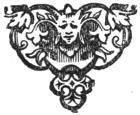
Picture credits:
Ederland the Poultry Maid: 'She sailed out upon the stormy sea, letting the waves carry her as they chose' : by George W HoodTroll mother and son, by John Bauer
Published on April 21, 2020 02:57
April 14, 2020
Strong Fairy Tale Heroines #8: ASCHENPUTTEL
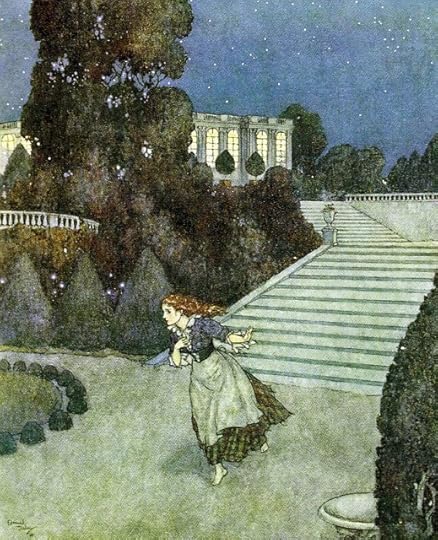
Aschenputtel: The Cinderella of the Brothers Grimm
The most familiar of fairytales can seem strange when we read a different version from the one we’re used to. Most of us know the one generally offered to children, the one Disney adapted, the one based on Charles Perrault’s ‘Cendrillon’. ThatCinderella is a long-suffering, patient, gentle girl; her fairy godmother is a civilised sponsor who launches her protégé into society with the aid of delightful conjuring tricks, transforming pumpkin and mice into a splendid coach and uniformed servitors. At the end of Perrault's tale, Cinderella forgives her stepsisters and marries them off to ‘two great lords of the court’. Everything is in excellent taste.
But the heroine of the Grimms’ ‘Aschenputtel’ is different. Her story is less literary, more magical: almost savage in tone and detail. There is blood within the shoe. The dead return as birds. There's no pumpkin coach, no fairy godmother. No panic, no deadlines, no clocks striking twelve. No glass slipper – and no forgiveness.
The mother’s deathbed adjuration, that if her daughter remains good, she will watch over her from heaven, is less a pious wish than a supernatural promise, fulfilled when her father asks his daughters what he should bring them as gifts and Cinderella asks not for beautiful clothes, pearls and jewels as her step-sisters do, but for ‘the first branch which knocks against your hat on the way home’. Like the rose in Beauty and the Beast, this humble gift will prove the most precious, as well as being something that will certainly pass under her step-mother and step-sisters’ radar. Cinderella plants the hazel twig on her mother’s grave and waters it with her tears. And in contrast to the civilised patronage of Perrault’s fairy godmother, the power the girl derives from her true mother’s grave is a miraculous inheritance that rises from the earth in green sap and leaves, with spirit-like birds sitting in the branches.
At her call, these birds flock down to perform the impossible tasks her stepmother sets for her – and each time Cinderella succeeds, the stepmother breaks her promise to allow her to go to the festival. We are not meant to view this realistically, or ask why the stepmother and Cinderella should expect any different outcome from each other after the first demonstration. We are witnessing the breaking of a ritual, magical contract which will earn a ritual, magical punishment.
The unbroken bond between Cinderella and her dead mother trumps the step-mother’s broken promises. For the next three nights, as the white birds in the hazel tree shower down upon her their transformative gold and silver, Cinderella stage-manages the whole affair. She goes to the dance alone. She leaves when she pleases. She runs, climbs trees and jumps out of them. She performs lightning costume-changes, and she lies low to deceive the family.
It's a story which pulls few punches. Quite frankly, a great deal of the pleasure it affords is the pleasure of revenge. This Cinderella gets her own back on everyone who has ill-treated her. When her neglectful father’s pigeon house is destroyed, we shouldn't think of a cute ornamental dove-cot sitting on a pole. We should imagine the pigeon-house of a grand mansion: a great, circular, stone-built affair with hundreds of niches inside it for nesting places, and a revolving ladder from which servants might collect eggs and young birds. Its destruction would be a social and financial blow. Her father also loses his magnificent pear tree - it is chopped to pieces – and her ambitious step-sisters fare even worse. And, an incidental detail - the prince doesn't need to try the slipper on the foot of every girl in the kingdom. By the third night he's got a very good idea of where Cinderella lives, so the mysterious maiden has to be one of the three daughters.
The translation is by Margaret Hunt.

The wife of a rich man fell sick, and as she felt that her end was drawing near, she called her only daughter to her bedside and said, “Dear child, be good and pious, and then the good God will always protect you, and I will look down on you from heaven, and see you.” Thereupon she closed her eyes and departed. Every day the maiden went out to her mother’s grave and wept, and she remained pious and good. When winter came the snow spread a white sheet over the grave, and by the time the spring sun had drawn it off again, the man had taken another wife.
The woman brought with her into the house two daughters, who were beautiful and fair, but vile and black of heart. Now began a bad time for the poor step-child. “Is the stupid goose to sit in the parlour with us?” they said. “He who wants to eat bread must earn it; out with the kitchen-wench.” They took her pretty clothes away from her, put an old grey bedgown on her, and gave her wooden shoes. “Just look at the proud princess, how decked out she is!” they cried, and laughed, and led her into the kitchen. There she had to do hard work from morning till night, get up before daybreak, carry water, light fires, cook and wash. Besides this, the sisters did her every imaginable injury – they mocked her and emptied her peas and lentils into the ashes, so that she was forced to sit and pick them out again. In the evening when she had worked till she was weary she had no bed to go to, but had to sleep by the hearth in the cinders. And as on that account she always looked dusty and dirty, they called her Cinderella.
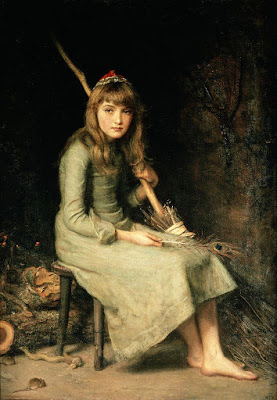
It happened that the father was once going to the fair, and he asked his two step-daughters what he should bring back for them. “Beautiful dresses,” said one, “pearls and jewels,” said the second. “And you, Cinderella,” said he, “what will you have?” “Father, break off for me the first branch that knocks against your hat on the way home.” So he bought beautiful dresses, pearls and jewels for his two step-daughters, and on his way home as he was riding through a green thicket, a hazel twig brushed against him and knocked off his hat. Then he broke off the branch and took it with him. When he reached home he gave his step-daughters the things which they had wished for, and to Cinderella he gave the branch from the hazel bush. Cinderella thanked him, went to her mother’s grave and planted the branch on it, and wept so much that the tears fell down on it and watered it. And it grew and became a handsome tree. Thrice a day Cinderella went and sat beneath it and wept and prayed, and a little white bird always came on the tree, and if Cinderella wished for anything, the bird threw down to her what she had wished for.

It happened, however, that the King gave orders for a festival which was to last three days and to which all the beautiful young girls in the country were invited, in order that his son might choose himself a bride. When the two step-sisters heard that they too were to appear among the number, they were delighted, called Cinderella and said: “Comb our hair for us, brush our shoes and fasten our buckles, for we are going to the wedding at the King’s palace.” Cinderella obeyed, but wept, for she too would have liked to go with them to the dance, and begged her step-mother to allow her to do so. “You go, Cinderella!” said she; “covered in dust and dirt as you are, and would go to the festival? You have no clothes and shoes, and yet would dance?” However, as Cinderella went on asking, the step-mother said at last, “I have emptied a dish of lentils into the ashes for you; if you have picked them out again in two hours, you shall go with us.”
The maiden went through the back door into the garden and called, “You tame pigeons, you turtledoves, and all you birds beneath the sky, come and help me to pick
The good into the potThe bad into the crop.”

Then two white pigeons came in by the kitchen window, and afterwards the turtledoves, and at last all the birds beneath the sky, came whirring and crowding in, and alighted amongst the ashes. And the pigeons nodded with their heads and began pick, pick, pick, and all the rest began also to pick, pick, pick, and gathered all the good grains into the dish. Hardly had one hour passed before they had finished and all flew out again. Then the girl took the dish to her step-mother, and was glad, for she believed that now she would be allowed to go with them to the festival.
But the step-mother said, “No, Cinderella, you have no clothes and you can not dance; you would only be laughed at.” And as Cinderella wept at this, the step-mother said, “If you can pick two dishes of lentils out of the ashes for me in one house, you shall go with us.” For she thought to herself, “That she most certainly cannot do again.”
When the step-mother had emptied the two dishes of lentils among the ashes, the maiden went through the back door into the garden and cried: “You tame pigeons, you turtledoves, and all you birds beneath the sky, come and help me to pick
The good into the potThe bad into the crop.”
Then two white pigeons came in by the kitchen window, and afterwards the turtledoves, and at last all the birds beneath the sky, came whirring and crowding in, and alighted amongst the ashes. And the pigeons nodded with their heads and began pick, pick, pick, and all the rest began also to pick, pick, pick, and gathered all the good seeds into the dishes, and before half an hour was over they had already finished, and all flew out again. Then the maiden carried the dishes to ther step-mother and was delighted, and believed that she might now go with them to the wedding. But the step-mother said, “All this will not help; you cannot go with us, for you have no clothes and can not dance; we should be ashamed of you.” On this she turned her back on Cinderella and hurried away with her two proud daughters.
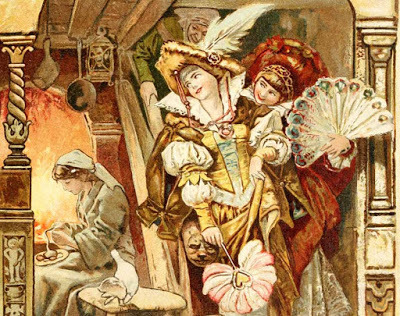
As no one was now at home, Cinderella went to her mother’s grave below the hazel tree, and cried,
“Shiver and quiver, little tree, Silver and gold throw down on me.”
Then the bird threw a gold and silver dress down to her, and slippers embroidered with silk and silver. She put on the dress with all speed, and went to the wedding. Her step-sisters and the step-mother did not know her and thought she must be a foreign princess, for she looked so beautiful in the golden dress. They never once thought of Cinderella and believed she was still at home in the dirt, picking lentils out of the ashes. The prince approached her, took her by the hand and danced with her. He would dance with no other maiden, and never let loose of her hand, and if any one else came to invite her, he said, “This is my partner.”
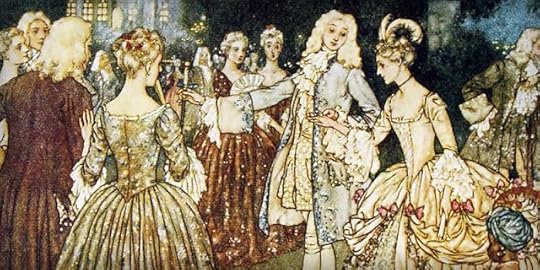
She danced till it was evening, and then she wanted to go home. But the King’s son said, “I will go with you and bear you company,” for he wished to see to what family the beautiful maiden belonged. She escaped from him, however, and sprang into the pigeon-house. The King’s son waited until her father came home, and then he told him that the unknown maiden had leapt into the pigeon-house. The old man thought, “Can it be Cinderella?” and they had to bring him an axe and a pickaxe that he might hew the pigeon house to pieces, but no one was inside it. And when they got home, Cinderella lay in her dirty clothes among the ashes, and a dim little oil lamp was burning on the mantle-piece, for Cinderella had jumped down quickly from the back of the pigeon-house and had run to the little hazel tree, and there she had taken off her beautiful clothes and laid them on the grave, and the bird had taken them away again, and then she had seated herself in the kitchen amongst the ashes in her grey gown.
Next day when the festival began afresh, and her parents and the step-sisters had gone once more, Cinderella went to the hazel tree and said,
“Shiver and quiver, my little tree, Silver and gold throw down over me.”

Then the bird threw down a much more beautiful dress than before. And when Cinderella appeared at the wedding in this dress, everyone was astonished at her beauty. The King’s son had waited until she came, and instantly took her by the hand, and danced with no one but her. When others came and invited her, he said, “This is my partner.” When evening came she wished to leave, and the King’s son followed her and wanted to see to which house she went. But she sprang away from him and into the garden behind the house. There stood a beautiful tree on which hung the most magnificent pears. She clambered so nimbly between the branches like a squirrel that the King’s son did not know where she had gone. He waited until her father came and said to him, “The unknown maiden has escaped from me, and I believe she has climbed into the pear tree.” The father thought, “Can it be Cinderella?” and had an axe brought and cut the tree down, but no one was in it. And when they got into the kitchen, Cinderella lay there among the ashes as usual, for she had jumped down on the other side of the tree, had taken the beautiful dress to the bird on the little hazel tree, and put on her grey gown.
On the third day, when the parents and sisters had gone away, Cinderella went once more to her mother’s grave and said to the little tree,
“Shiver and quiver, my little tree, Silver and gold throw down over me.”
And now the bird threw down to her a dress which was more splendid and magnificent than any she had yet had, and the slippers were golden. And when she went to the festival in the dress, no one knew how to speak for astonishment. The King’s son danced with her only, and if anyone invited her to dance, he said, “This is my partner.”

When evening came, Cinderella wished to leave, and the King’s son was anxious to go with her, but she escaped from him so quickly he could not follow her. The King’s son, however, had caused the whole staircase to be smeared with pitch, and there, where she ran down it, the maiden’s left slipper had remained stuck. The King’s son picked it up,and it was small and dainty, and all golden. Next morning he went to his father and said, “No one shall be my wife but she whose foot this golden slipper fits.”

Then the two sisters were glad, for they had pretty feet. The eldest went with the shoe into her room and wanted to try it on, and her mother stood by. But she could not get her big toe into it, and the shoe was too small for her. Then her mother gave he a knife and said, “Cut the toe off; when you are Queen you will have no more need to go on foot.” The maiden cut the toe off, forced her foot into the shoe, swallowed the pain and went out to the King’s son. He took her on his horse as his bride and rode away with her, but the way took them past the grave and there on the hazel tree sat the two pigeons and cried,
“Turn and peep, turn and peep, There’s blood within the shoe, The shoe it is too small for her, The true bride waits for you.”
Then he looked at the foot and saw how the blood was trickling from it. He turned his horse around and took the false bride home again and said she was not the true one, and that the other sister was to put the shoe on. Then this one went into her chamber and got her toes safely into the shoe, but her heel was too large. So her other gave her a knife and said, “Cut a bit off your heel; when you are Queen you will have no more need to go on foot.” The maiden cut a bit off her heel, swallowed the pain, and went out to the King’s son. He took her on his horse as his bride and rode away with her, but when they passed the hazel tree, the two little doves sat on it and cried,
“Turn and peep, turn and peep, There’s blood within the shoe, The shoe it is too small for her, The true bride waits for you.”
He looked down at her foot and saw how the blood was running out of her shoe and how it had stained her white stocking quite red. Then he turned his horse and took the false bride home again. “This also is not the right one,” said he, “have you no other daughter?” “No,” said the man, “there is still a little stunted kitchen wench which my late wife left behind her, but she cannot possibly be the bride.”
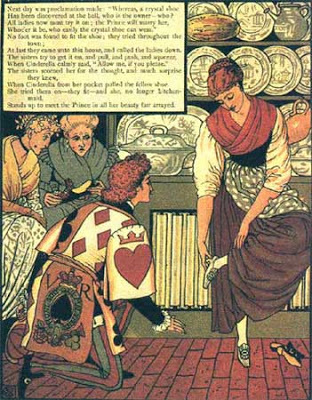
The King’s son said he was to send her up to him, but the mother answered, “Oh no, she is much too dirty, she cannot show herself!” But he absolutely insisted on it, and Cinderella had to be called. She first washed her hands and face clean, and then went and bowed before the King’s son, who gave her the golden shoe. Then she seated herself on a stool, drew her foot out of the heavy wooden shoe and put it into the slipper, which fitted like a glove. And when she rose up and the King’s son looked at her face he recognised the beautiful maiden who had danced with him and cried, “That is the true bride!” The step-mother and the two sisters were horrified and became pale with rage; however, he took Cinderella on his horse and rode away with her. As they passed by the hazel tree, the two white doves cried,
“Turn and peep, turn and peep, No blood is in the shoe, The shoe is not too small for her, The true bride rides with you,”
and when they had cried that, the two came flying down and perched on Cinderella’s shoulders, one on the right, the other on the left, and remained sitting there.
When the wedding with the King’s son was to be celebrated, the two false sisters came and wanted to get into favour with Cinderella and share her good fortune. When the betrothed couple went to church, the elder was at the right side, and the younger at the left, and the pigeons pecked out one eye from each of them. Afterwards as they came back, the pigeons pecked out the other eye from each and so, for their wickedness and falsehood, they were punished with blindness for the rest of their days.

Picture Credits:
Cinderella: by Edmund DulacCinderella at the hearth: John Everett Millais
Aschenputtel at her mother's grave: by Liga-MartaAschenputtel and the turtledoves: by Alexander Zick
Aschenputtel and the stepsisters: by Hermann Vogel
Cinderella at the ball: by Edmund Dulac
Shiver and Quiver, Little Tree: by Millicent Sowerby
Pitch on the stairs: by John D Batten
Cinderella running: by Arthur Rackham Cinderella tries on the slipper: by Walter Crane
Published on April 14, 2020 02:26
April 7, 2020
Strong Fairy Tale Heroines #7: THE MASTERMAID
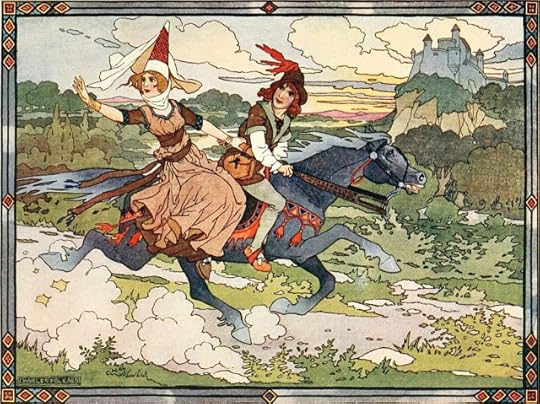
This fast-moving Norwegian fairy tale from Asbjørnsen and Moe was translated into English by Sir George Dasent in ‘Popular Tales from the Norse’ (1859). Nineteenth century translations can feel a little stiff nowadays and we tend to read them with too much respect. I decided to tell this story aloud a few months ago, but it came to life for me when I tweaked it a bit and told it in a strong Yorkshire accent (which is where I'm from). Traces of this should be obvious in the version below. This helped me bring out not only the Northern-ness of the tale, but also the sheer fun and naughtiness of the original, such as the bit near the end, where the Mastermaid takes various men to bed with her only to make them stand up all night gripping such suggestive items as a poker or a calf’s tail...
The story begins as if it’s all going to be about a prince, but though he’s an attractive, cheeky lad, he can’t achieve anything without the Mastermaid (the clue’s in her name)! The tale is classed as Aarne–Thompson type 313A, 'the girl helps the hero flee', a category which in my opinion ought to be renamed 'the heroine rescues the boy'. The Mastermaid saves the prince's life four separate times, provides him with invaluable advice, organises his escape, saves him from marrying a troll, and generally sorts everything out with tremendous aplomb.
There was once a king’s son who had a fancy to see the world. Off he set, and after travelling for several days he found a door that was built into the mountain. It was the door to a troll’s house; he spent the night there and hired himself out next day as the troll’s servant.
In the morning, before the troll went out to graze his herd of goats on the mountain meadows, he told the king’s son to shovel out the stable. ‘I’m an easy-going master,’ he said, ‘when you’ve done that, you can have the rest of the day off, but do your work well, and don’t go poking into any of the other rooms in the house, or I’ll tear your head off.’
‘He does seem an easy master!’ said the lad to himself. He thought he’d have plenty of time, so he walked about humming, and then he thought he wouldtake a look into some of the other rooms. What might the troll be hiding?
In the middle of the first room a big cauldron was boiling and bubbling away with no fire under it! ‘What’s cooking?’ the king’s son wondered, and he looked in, a piece of his hair swung down into the broth and came out with each strand bright as copper.
‘Funny soup, that!’ said the lad, ‘if anyone sipped it, they’d have copper lips!’ and he went into the second room.
Here was another cauldron simmering away with no fire. ‘I’ll try this one too,’ he says and dips a second lock of hair in. Out it comes, shining silver. ‘Expensive soup!’ says he, ‘we’ve nothing like it my father’s castle, but how does it taste?’ and he went into the next room where there was a third cauldron bubbling and steaming.
The lad dipped another lock of hair in, and this time it came out gleaming gold. ‘Anyone who drank that would get a gilded gullet!’ he said, ‘but if that’s gold, what’ll I find next?’ and he opened the door to the fourth room, and in it a girl was sitting on a bench, the loveliest lass the lad had ever seen.
‘God in heaven,’ she says, ‘what do you want? And what are you doing here?’
‘I’ve just been hired by the troll,’ he says.
‘Have you any idea what you’ll have to do for him?’ she asks.
‘Oh he’s an easy sort of chap,’ says the king’s son. ‘All I have to do is muck out the stable, nothing hard, and then I can take time off.’
‘You think that’s easy? If you set about it the usual way, ten shovelfuls will fly in for every one you chuck out. I’ll tell you what to do: turn the pitchfork around and shovel with the handle, then all the muck will fly out by itself!’
He’d do that, all right, thought the king’s son, and then the two of them sat chattering away, falling in love, till as evening came the lad thought he’d better go out and do his work, and as soon as he turned the pitchfork upside down, all the muck flew out by itself to the dungheap and the stable was as clean as clean.
Troll comes back with the goats. ‘Have you shovelled out t'stable?’ he asks
. ‘I have that, it’s as clean as clean.’
‘I’ll see for myself!’ says the troll, and he came and saw, and he says, ‘You must have been talking to my Mastermaid! You haven’t got enough between the ears to have managed it yourself.’
‘Mastermaid?’ says the lad, pretending to be thick, ‘what sort of a thing is that? I’d love to see it. Can I see it?’
‘You’ll see soon enough,’ says the troll.
Next morning the troll gave the lad instructions to go up the mountain and bring down the horse which was grazing up there. ‘When you’ve done that you can take things easy the rest of the day, but don’t go into any of the other rooms, or I’ll wring your head off!’
‘Kind master or not,’ thought the king’s son, ‘I’ll talk to the Mastermaid all the same. Yours, is she? What if she’d rather be mine?’ and he went to see her.
‘What work has he given you today?’ she asks.
‘Nowt much,’ says the king’s son. ‘Just go up the mountain to fetch his horse.’
‘And how are you going to do that?’
‘Shouldn’t be hard, should it? I’ll bet I’ve ridden better horses than his!’
‘It won’t be as easy as you think,’ said the Mastermaid, ‘but I’ll tell you what to do. It’ll rush at you as soon as it sees you, breathing fire and flame, but if you take that bridle hanging there by the door and throw it over its head, it’ll calm down and follow you like a lamb.’
Well, the lad would certainly take her advice, and so they sat chatting and thought how wonderful it would be if they could get away together and escape the troll… and he would have forgotten all about going to fetch the horse if the Mastermaid hadn’t reminded him as evening came on, so he took the bridle and climbed the mountain, and as the horse came rushing at him with blazing eyes and flaming jaws he threw the bridle over its head, and then it was tame and followed him back like a lamb.
Troll comes home. ‘Is horse in’t stable?’
‘Oh aye,’ says the lad. ‘A nice quiet nag, I rode it back and shut it in the stall, I did.’
‘I’ll see for myself!’ says the troll. And there was the horse, just as the lad had said. ‘You must have been talking to my Mastermaid!’ said the troll. ‘You could never have worked that out for yourself!’
‘Mastermaid? Mastermaid? You said that yesterday, and still I don’t know what a Mastermaid is. I wish you’d show me, master, indeed I do,’ said the king’s son, thick as a brick.
‘You’ll find out soon enough!’ said the troll.
Next day the troll went out with his goats as before. ‘Today it’s off to hell with you, to fetch the fire-tax,’ he said to the lad. ‘You can take it easy the rest of the day! Lucky for you I’m such a kind master.’ Off he went.
‘Oh aye, very kind,’ says the lad, ‘to give me all the dirty jobs. I’d better find the Mastermaid.’ And he went to her. ‘What’ll I do? I’ve never been to hell. I don’t know the way! And I don’t know how much to ask for!’
‘Oh, I can tell you all that. Go to the cliff face below the mountain, take this club with you and knock on the wall with it. Then someone will come out with sparks flying off him. Tell him your errand, and when he asks how much you want, you say, “As much as I can carry!”’
Well, the lad thought he could do that, and then they sat talking all day long and he would be sitting there still if the Mastermaid hadn’t reminded him to go and fetch the fire tax before the troll came home.
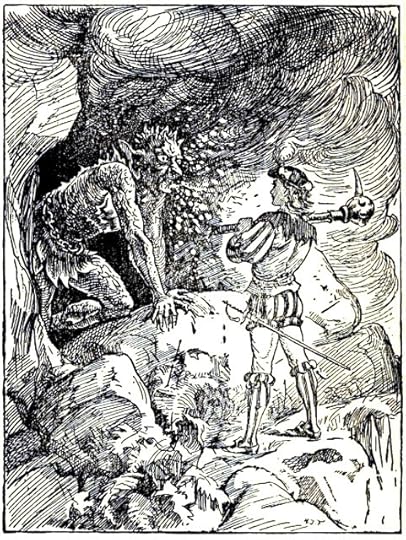
Off he went and knocked at the cliff with the club, and out came someone swarming with sparks, fire flying from his hair and eyes and nose. ‘What do you want?’
‘I’ve come from the troll, for the fire tax!’
‘How much?’
‘Oh, just as much as I can carry.’
‘You’re lucky you didn’t ask for more. Come with me!’ So he led the king’s son into the hill, and there were piles of gold and silver like stones in a rockfall, and the lad took as much as he could carry and went home.
Troll comes back. ‘Where’s fire tax?’
‘In that sack by wall!’
‘I’ll see for myself!’ said the troll, and he looked in the sack and it was full to the brim with gold and silver. ‘You’ve certainly been talking to my Mastermaid – and if you have, I’ll wring your head off!’
‘Mastermaid?’ said the lad. ‘You keep talking about this Mastermaid. I wish I could see the thing. I really do!’
‘You’ll have your wish,’ said the troll. ‘I’ll take you to see her tomorrow.’
Next day troll takes the king’s son to t’ Mastermaid and says to her, ‘Get on and butcher him, and cook him up in’t big cauldron while I have a nap. When broth’s ready, call me!’ He lay down on’t bench and went to sleep, snoring so loud it shook the mountain.
The Mastermaid takes a knife, cuts the lad’s finger and lets three drops of blood fall onto a three-legged stool. She piles up all the old rags and worn-out shoes and rubbish she can find, and drops them into the cauldron. She fills up a box with powdered gold, grabs a block of salt and a flask of water. Then she catches up a golden apple and the troll’s two golden hens, and off she goes wi’t king’s son, fast as they can, till they come to t’ sea, jump on board ship and set off over the waves.
Back home, the troll stretches a bit and stirs. ‘Is broth ready yet?’
‘Just started to boil,’ said the first drop of blood and the troll goes back to sleep. After a while he stirs again. ‘In’t it ready yet?’
‘Half-cooked!’ says second drop of blood. So the troll goes back to sleep. Hours later he yawns and rubs his eyes. ‘Is it done?’
‘Ready!’ says third drop of blood. So the troll got up and he couldn’t see the Mastermaid, but the cauldron was steaming, and he was clemmed. Hungry! He took the ladle and tried the soup, and it’s nothing but mashed up rags and old leather, and he was so angry he didn’t know what leg to stand on, and he set off after the Mastermaid and the king’s son as fast as he could go. Soon he comes to the edge of the fjord, and he can see the two of them far off on the ship, but he can’t cross the water. So he calls his River-sucker, and the River-sucker lies down at the fjord’s edge and sucks and sucks till the fjord’s almost dry.
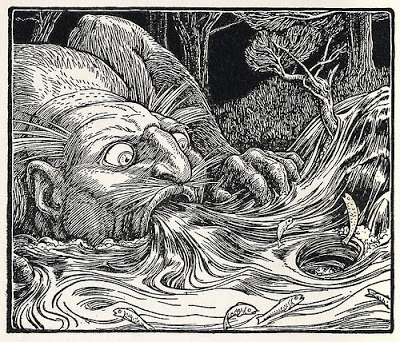
‘Throw out that block of salt!’ cries the Mastermaid, so the king’s son threw out the block of salt behind the ship, and it turned into a mighty mountain too high to climb, that blocked the way. ‘I’ll call for my Mountain-borer!’ yelled the troll, and his Mountain-borer came and bored a hole right through the mountain, but just as the troll was scrambling through it the Mastermaid cried, ‘Pour out the flask of water!’ and the king’s son did, and the tunnel filled with water and the troll was swept away and drowned.
So now the lad wants to take Mastermaid back to his father, but he wants to do it in style. ‘Just wait for me here, while I go on. There’s seven grand horses in my father’s stable, and a carriage. I’ll fettle them up and bring them for you.’
‘Oh no, don’t do that!’ said the Mastermaid, ‘if you go home without me, you’ll forget me, I know you will.’
‘How could I forget you after all we’ve been through together and when we love each other so much?’
‘All right’ said the Mastermaid, ‘go if you will, but don’t speak to anyone and whatever you do don’t have a bite to eat – if you do, it’ll be bad luck for both of us.’ He said he wouldn’t, and off he went.
But when he got to his dad’s castle, one of his brothers had just got married and they were all celebrating. They were right glad to see him and asked him to join the feast, but he wouldn’t say nowt, he brushed them off and went to t’ stables to hitch up the horses. Well, this woman comes after him, she’s the bride’s step-sister, and she chucks him an apple, ‘If you won’t stay with us, have a bite of that,’ she cries, and as he were hungry and thirsty he took a bite, and all at once he forgot the Mastermaid and all that had gone on wi’ him and her. ‘I must have gone mad. What do I want these horses for?’ And he went back into t’ castle, and no time at all he was engaged to marry the woman who gi’en him the apple, who was really a troll.
The Mastermaid waited and waited, but as king’s son didn’t come she walked along till she came to a dirty little cottage close by the king’s meadows. In she goes and lights a fire, and then she takes out the box of gold dust and chucks half of it on’t fire so it spits and splutters and gilds the whole cottage inside and out, till it shines like the sun.
Who should come riding by but the Constable? He was so mithered by the glittering cottage and so smitten by the lovely lass sitting by t’ door, that he asks her to marry him, straight off.
‘I might, if you’ve plenty of brass,’ she says.
Oh, he had plenty of that! So he comes back that evening with half a sackful, leans it in’t corner and they go to bed. But soon as they’re in bed, the Mastermaid sits up. ‘I forgot to stoke fire,’ says she.
‘I’ll do it!’ says Constable, and he jumps out of bed.
‘Tell me when you’re grabbed hold of poker,’ says the Mastermaid.
‘I’m holding it now!’ says he.
‘Then you hold on to the poker and the poker hold you, and you can chuck coals all over yourself till morning!’ says the Mastermaid. So the Constable stands there all night, flinging fiery coals and embers all over himself till daybreak, and then he could let the poker go and he took to his heels as if the devil was after him. And did he say a word to anyone? Not likely!
Next day an Attorney comes riding past, and when he claps eyes on t’ golden hut and the beautiful maiden, down he goes on his knees and asks to marry her. ‘I might,’ said the Mastermaid, ‘if you’ve plenty of brass, I might…’
The Attorney was rich enough, so he come back that evening with a big sackful and leans it in the corner, and they went to bed. But as soon as they lie down, the Mastermaid sits up.
‘I forgot to shut porch door,’ said she.
‘Lord, what a time to remember that!’ says Attorney. ‘I’ll do it,’ and he jumps out of bed.
‘Tell me when handle’s in your hand,’ says the Mastermaid.
‘I’m holding it now,’ calls the Attorney.
‘Right, well you hold door handle and door handle hold you, and rush you this way and that till morning!’ said she. Well, the Attorney never had such a night, as the door rushed him this way and that all night long, almost battering him to death, and as daybreak came he fled home, leaving his money behind. And did he breathe a word to anyone? Not likely!
On the third day, a Bailiff came by, and same thing happens. He wants to marry the Mastermaid and she says she might, if he has enough brass! Oh, the Bailiff had plenty. Back he comes that evening with an even bigger sack than the Attorney – so that was all right, and off they go to bed. But hardly did their heads touch pillow when the Mastermaid sits up.
‘I’ve forgotten to shut the calf away,’ she says. ‘I’ll have to go out and do it now.’
‘I’ll do it!’ says Bailiff, and he jumps out of bed.
‘Tell me when you’ve got hold of calf’s tail,’ says the Mastermaid.
‘I’ve got hold of it now!’ cries the Bailiff.
‘Then you hold on to the calf’s tail, and the calf’s tail hold you, and you can run over the whole world till daybreak,’ says the Mastermaid. And off goes the calf, kicking and leaping, and drags the Bailiff up mountains and down dales, and the more he yells the faster it runs, and by daylight he’s so worn out he can hardly limp home.
Now the very next day was the day of the King’s son’s wedding to the sister of his brother’s bride, the woman who gived him the apple. But when they climbed into t’ carriage to drive to the church, one of the axles broke, and it couldn’t be mended, and then Constable, who’d come to t’ wedding, said there was a lass living in a gold cottage down by the meadows, and they ought to ‘see if she’ll lend you her poker, that’ll hold all right!’ So they sent a messenger, and the Mastermaid didn’t say no, and they used poker instead of axle and it worked!
But as soon as they got going, the floor of the carriage drops out underneath them. So the Attorney says, ‘See if the lass in the gold cottage will lend you her gilded door, I guarantee that won’t break!’
Well, the Mastermaid lends the door. So that’s fettled, but this time when they try to set off again, the horses won’t move. They hitch up six, then eight, then ten, but still the horses won’t stir, and it’s getting late. The Bailiff spoke up. ‘See if the lass in the gold cottage’ll lend you her calf. That beast’ll pull anything!’
Well, the Mastermaid lends them the calf and they unhitch the horses and put it in the traces and what did it do? It shoots away with that carriage over hill and dale, sometimes on the ground, sometimes in the air, and when it reaches the church it goes around and around the steeple like a yarn-winder, and they only just manage to get out. And on t’ way back from the wedding it does the same, only even faster.
Now as they sat down to feast, the king’s son – the bridegroom – thought they ought to invite the lass in the gold cottage, who’d lent them her poker, her door and her calf, ‘Without her, we’d never have got to church in time!’ And the king said this was only fair, and he sent five of his best men down to the gold cottage to invite the lass to dinner.
‘If king’s not good enough to come and see me, he’s not good enough for me to come and see him,’ said the Mastermaid, so the king had to go down himself and invite her to dinner, and the Mastermaid went with him and he put her in the seat of honour, next to the bridegroom. When she’d sat down, the Mastermaid took out the two gold hens and the golden apple she had brought from troll’s house and put them on the table, and the two hens started pecking and fighting over the golden apple.
‘By heck,’ said the king’s son, ‘look at the way them hens is struggling to get at the apple!’
‘Aye,’ says the Mastermaid, ‘That’s just the way we two struggled to get our freedom, when we were shut in troll’s house under the mountain.’
Then the king’s son remembered everything! He knew who she was, and you can’t think how happy they was, the two of them! As for the troll bride who’d given him the apple, the king told her off to be torn in twenty pieces between twenty horses, and then they could really celebrate, and Constable, Attorney and Bailiff danced all night at the wedding!
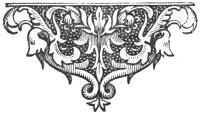
More about fairy tales and folklore in "Seven Miles of Steel Thistles" available from Amazon here and here.
Picture credits
The Mastermaid by Charles Folkard
The Prince collects the fire-tax by HJ Ford
The River-Sucker by HJ Ford
Published on April 07, 2020 01:40
March 31, 2020
Strong Fairy Tale Heroines #6: GILLA OF THE ENCHANTMENTS
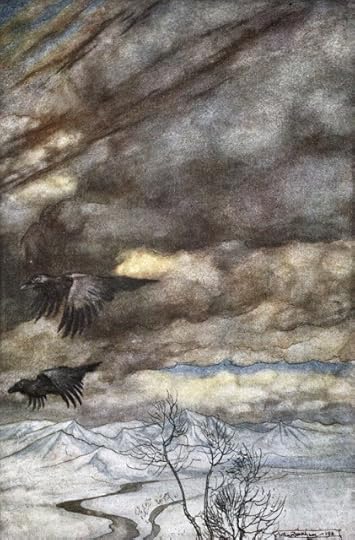
GILLA OF THE ENCHANTMENTS
Told in the 1880s by Patrick McGrale of Dugort, Achil, County Mayo, to William Larminie (“West Irish Folk-Tales”, Camden Library, 1893). Larminie says of this tale that it combines domestic incident with romantic extravagance. It is a variant of Aarne-Thompson Tale Type 451: the brothers who are turned into birds. Towards the end of the story I have made some slight changes where Patrick McGrale's oral rendition, faithfully reproduced by Larminie, becomes a little unclear as to who does what to whom.
Although the parallels with better-known tales are clear (such as the Grimms' 'The Six Swans', KHM 49, and 'The Seven Ravens, KHM 25), this story has its own individual character. It’s both confusing and fascinating, with a great deal to puzzle over. On the death of his wife the queen, Gilla’s father sends his three sons away to a ‘greenawn’ – a sort of sunny pavilion on an island. He appears to do this in order to keep them safe from his new wife, from whom he has kept all knowledge of them. But his daughter Gilla has inherited powerful magic in the shape of a cloak left to her by her dead mother (just as the power of Aschenputtel’s dead mother is channeled to her through the tree planted on her grave). She cannot be harmed while she is wearing it. Only Gilla may ever visit the brothers; she brings them food, and she cuts off, washes and replaces their heads each day. It is as if they are dependent on their sister for continuance in life: perhaps the greenawn itself is an otherworld, a liminal land which requires them to undergo a daily resurrection only Gilla can perform. Gilla is both a magic-worker, and a person who can bring back the dead. At the same time, she belongs to the fairy tale sisterhood of those who persist and endure trials in order to rescue the brothers they love. The motif of the death of a child, and smearing its mother with blood in an attempt to frame her for its murder, is reminiscent of the story of Rhiannon and her son Pryderi, in the First Branch of the Mabinogi.
There was a king in Ireland and his wife, and they had but one daughter, whose name was Gilla of the Enchantments, and she had a magic coat that her mother had left her when she died. And there was a man courting her whose name was George nă Riell, and the two were courting.
When her mother died the king made a fair and beautiful greenawn [a summer-house or sunny palace] for his three sons on an island in the midst of the sea, and there he put them to live, and he sent his daughter to them with food every evening.
It was not long after that till he married another wife, and by this wife he had three daughters. She was one day walking in the garden and she got the corner of her apron under her foot and she fell.
“May neither God nor Mary be with you,” said the hen-wife.
“Why do you say that?” said the queen.
“Because the wife that was here before you was better than you.”
“Was there a wife before me?”
“There was; and that one is her daughter, and there are three sons also in an island in the sea, and the daughter goes every night to them with food.”
“What shall I do to the three of them, to put them to death?”
“I’ll tell you,” said the hen-wife, “if you will do what I advise you.”
“I will do it,” said she.
“Promise a dowry to your eldest daughter if she will follow the other daughter out when she is going with food to her brothers.”
So the queen sent her daughter out after Gilla who was going with food, but Gilla looked behind and saw the other one coming, and she made a bog and a lake between them, so that the queen’s daughter went astray and was wandering all night. She told her mother, and her mother went to the henwife, and the henwife said, “Promise a dowry to your second daughter.”
And she did this, and the second daughter fared in the same way as the first, and she came and told her mother. And the mother went to the hen-wife, and the hen-wife said, “Promise the dowry to your third daughter.”
Now the third daughter followed Gilla of the Enchantments as she was going with the food, and this time Gilla did not look behind her. She parted the sea and she came to her brothers’ house, and she put the pot of water down and cut off the heads of her three brothers and washed them, and put them on their shoulders again. And the half-sister was at the window looking on at everything she did, and she went home through the sea, before the sea returned together, and while they were eating their supper, Gilla came home.
The mother went next morning to the hen-wife and told her the third daughter had succeeded, and had learned everything. And she asked her what she should do.
“Say now, your daughter is going to be married, and ask Gilla for the loan of her coat. She will not know that the power of the coat will be gone if she gives it away. So long as she keeps the coat herself she can do everything; there are spells on the coat so that the sea must open before it, without closing after it; but she does not know that the spell of the coat will be lost.”
The third daughter got the loan of the coat from Gilla, but instead of going to be married, this is what she did. When night came she put the coat on and went to the house of her half-brothers, knocked at the door and asked them to open it. And one of the brothers said, “That is not my sister.” But another looked out of the window and saw the coat and recognised it, and he opened the door and let her in. She cut the three heads off, and took them three-quarters of a mile and put them into a hole in the ground, and went back to her other and told her she had killed the three.
She gave the coat back to Gilla of the Enchantments, and Gilla went in the evening to her brothers with food, and whatever sort of fastening the other one put on the door she could not open is, but had to go in by a window, and she found her three brothers dead.
She wept and she screamed and pulled the hair from her head in her lamentations, till the whiteness of the day came upon the morrow. She had not one head of the heads to get, but she followed the trace of the blood, and three-quarters of a mile from the house were they, in the place where they were buried. She dug them up and took them to her, and washed and cleaned them as was her wont, and put them on the bodies, but down they fell. She had to take them up at last, and cry to God to do something to them, that she might see them alive. And they turned into three otters, and she made another otter of herself. They were swimming that way for a time and then they made themselves into three doves, and she made of herself another dove. They were flying and she was flying, and the four came and settled on the gable of the house, and in the morning the man [the king] said to his wife,
“There is a barrel of water. Let it be wine in the evening.” (He thought to test her, he thought it was not the right woman he had got.)
Then said one of the brothers to the sister, “Go in, and do good in return for evil, and make wine of the water.”
She went down, and when she got in, and she in the shape of a dove, the old blind wise man who was lying in his bed under the window got his sight, and he saw her dipping her finger in the water and making of wine, cold and wholesome.
And in the morning the man said to his wife, “Here is a barrel of water. Let it be wine with you in the evening.”
And the second brother said to his sister, “Go in, and do good in return for evil, and make wine of the water.”
She went down, and when she went in at the window, and she in the shape of a dove, the wise old blind man who was lying on the bed under the window got his sight, and he saw her dipping her finger in the water and making it wine, cold and wholesome.
And in the morning on the third day the wise old man spoke to the king, and said to him that he had seen a beautiful woman come in by the window on two days, and that he got his sight when she came in and lost it when she went out and (said he) “Stretch yourself here today, and when she comes in and makes wine of the water, catch her as she is going out.”
And he did so, and the third brother said to his sister, “Go in, and do good in return for evil, and make the wine.” And she did this; and as she was going out the man caught her. And when her brothers heard that she was caught they went away. And she asked the king to to give her leave to take just one look at her brothers. “Here’s the corner of my apron.”
So he took hold of the corner of her apron, and she slipped out of it and left it with him and went away after her brothers. When they saw her coming they waited for her, and she asked them if there was anything at all in the world that would make them come alive again; and they said there was one thing only, and that hard it was to do it.
“What is it?” said she, “and I will try it.”
“To make three shirts of the ivy-leaves in a day and a year, without uttering a word of speech or shedding a single tear, for if you weep we shall lose a part of ourselves.”
And she said to them to make a little hut for her in the wood, and they made her the hut and went away and left her there. She was not long before she began to get material for the shirts, and she began to make them.
Now the queen’s daughter had her dowry. And she thought the king’s sons and the king’s daughter were dead, and she married George năRiell, and her mother died and her father, and now she was queen. But Gilla of the Enchantments was not long in the house in the wood, till George năRiell found her, and she did not speak a word to him, but he was with her till she had a child to him.
A young man was in the wood one day and a dog with him, and the dog took him to the place where the woman was, and the man saw the woman and the child there, and he went home and told the queen there was a beautiful woman in the wood. And the queen went and found the woman and the babe, and she killed the babe and caught up some of the blood and mixed the blood and ashes together and made a cake and she sought to put a piece of the cake in the woman’s mouth. And Gilla dropped one tear from her eye; but the queen who was her half-sister went back to her husband and said to him that great was the shame of him to have children by that woman, and that Gilla had killed her own child and eaten it.
“It is not possible,” said he, “that she has killed my child.”
“She killed and she ate.”
He went to her and found the child dead; but Gilla did not speak a word to him. He said then that he would burn her at twelve o’ clock of the next day. He commanded that every one should come in the morning with sods of turf and sheets of paper, and everything to make a fire. And she was brought and put there, and she was still sewing. When it was twelve o’ clock, the sign was given to light the fire, but an old man in the crowd asked them to give her another hour by the clock, and when that hour was passed he asked them to give her a half-hour; the woman in it (he said) was under geasa. “You see that it is not her life that is troubling her, but that she is always sewing.”
It was not long before they saw a black cloud coming through the air, and they saw three things in the cloud coming. “Well,” said the old man, “there are three angels from heaven, or three devils from hell, coming for her soul.”
There were three black ravens coming, and their mouths open, and as it were fire coming out of their mouths, till the three black ravens came and lay in their sister’s bosom, and she on top of the pyre, and she put the three shirts on them and said, –
“Finn, Inn and Brown Glegil, show that I am your sister, for in pain I am today.”
They took hold of her and lifted her down from the pyre, and the brothers told George nă Riell everything that the half-sister had done, first that she had killed the three of them, and afterwards that it was she that killed their sister’s child.
So the half-sister was thrown into the fire. And they went home, and George nă Riell married Gilla of the Enchantments, and they spent the rest of their lives as is right.
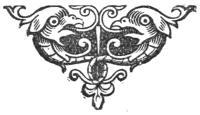
NB: since Gilla sheds one tear, it's possible that one of her brothers lacks an eye, but the narrator does not say so.
More on fairy tales and folklore in my book "Seven Miles of Steel Thistles" available from Amazon here and here.
Picture credit:
The Ravens of Wotan, Arthur Rackham
Published on March 31, 2020 04:02
March 24, 2020
Strong Fairy Tale Heroines #5: THE THREE PRINCESSES
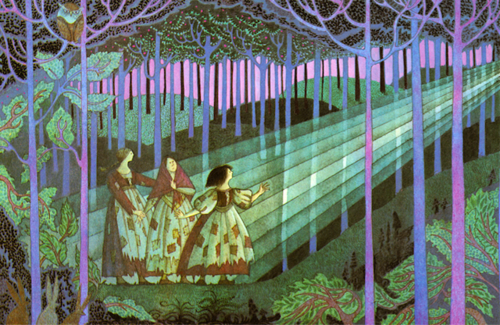
THE THREE PRINCESSES
This Hungarian story, in which the spirited third daughter of an impoverished king is abandoned in the forest with her two elder sisters, comes from ‘The Folk-Tales of the Magyars’ by W Henry Jones and Lewis L Kropf (Folklore Society Publications, 1889). It incorporates elements recognisable from Hansel and Gretel, Cinderella, and the Scottish tales Mollie Whuppie or Maol a Chliobain (in which the youngest child of a group of siblings defeats a giant), but although the ingredients may seem familiar and similar variants are told across Europe, this tale has a freshness and interest of its own. Wicked stepmothers and weak fathers are standard fare in fairy tales: sometimes the tales explore such relationships a little further but often, as in this case, the reader has to accept them as given and move on. I think you'll enjoy the surreal nonsense opening (intended to catch the attention of perhaps a rather raucous audience) and I love the mischievous manner in which the heroine gets her own back on her sisters on her final ride to the palace – and the bargain she strikes before agreeing to marry a particularly bloodless prince.
Once – I shan’t tell you where but you’d better believe me – there was a broken-down oven in splendid condition barring the sides, and it had cakes baking in it. One of you has eaten them! Well then, on the Komáran mountains, on the glass bridges, on the beautiful golden chandelier, there was once a Debreczen cloak with ninety-nine tucks in it, and in the fold of the ninety-ninth I found this tale…
There was a king with three daughters, but the king was so poor he could hardly keep his family; so one night his wife, who was the girls’ stepmother, told her husband that in the morning she would take the girls deep into the forest and leave them where they wouldn’t be able to find their way home.
But the youngest overheard her, and as soon as the king and queen fell asleep she hurried off to her godmother, who was a magic-worker, to ask her advice. Her godmother’s pony was waiting at the front gate, and taking her on its back it ran straight to the magic woman, who knew just what the child needed. She gave her a reel of cotton which she could unwind in the wood and so find her way back; but she made the condition that the girl was not to bring her elder sisters back with her, for they were very bad and proud.
Next morning the girls were led by their stepmother far into the wood to gather twigs, so she told them – and when they had wandered about for a long time she told them to rest. They sat down under a tree and soon all three fell asleep. Seeing this, the stepmother hurried home.
When they woke and discovered their mother was gone, the two elder girls began to cry, but the youngest was quiet. Then she said she knew how to find her way home but could not take them with her, upon which her sisters began to beg and implore and scold her, till at last she gave in. On their arrival home their father received them with open arms while their stepmother feigned delight. Next night she told the king that she would lead them even deeper into the wood. Again the youngest overheard the conversation, and just as before she rode the little pony to her godmother, who scolded her for having brought home her bad sisters. Making her god-daughter promise to obey this time, she gave her a bag full of ashes to scatter along the path as they went in; so the girls were led into the wood again and left there. And this time too, the youngest took her sisters home.
On the third night the stepmother once again schemed to lose them in the forest; and this time the girl didn’t have the courage to speak to her godmother; she thought she could help herself, so she took a bag full of peas, which she threw behind her as they went. When the mother abandoned them the two elder girls again began to cry, but the youngest said laughing that they could find their way home just as easily as they had before – but she could not find a single pea, for the birds had eaten them all.
Now the three outcasts wandered all day through the wood hungry and thirsty, for until sunset they did not find so much as a spring of water to quench their thirst. Here they found an acorn lying under an oak tree under which they chose to spend the night. They planted the acorn, and carried water to it in their mouths to water it, and by next morning it had grown into a tree as tall as a tower. The youngest girl climbed it to see if she could spy any house or dwelling from the top, but she saw nothing, and they spent the whole day crying and wandering about.
On the following morning, the tree was as tall as two towers, and still the girl could see nothing from its summit; but by the end of the third day the tree was as high as three towers, and from its topmost branches she saw a lighted window shining far away. She led her sisters in the direction of the light. They walked for three days and three nights, until at last they came to a beautiful castle. And now, far from being grateful, her sisters began to beat and bully her, and told her that when they knocked at the door she was to say that they were grand ladies and she was their servant.
What a fright they had! The door was opened by a woman as tall as a tower, with an eye as big as a plate in the middle of her forehead and teeth a foot long, which she gnashed at them. “What lovely girls!” she said. “What a splendid roast dinner you will make!” All three were terrified, but the youngest spoke up and told the giantess how skilled they all were at needlework, and described the beautiful clothes they could make for her, if only she would let them live.
The woman with the big teeth listened and agreed, and she hid the girls in a cupboard so her husband would not see them when he came home. But the giant sniffed about and demanded the human flesh he could smell, and his wife had to bring the girls out. Now the youngest again spoke up and told the giant what good cooks she and her sisters were, and described the wonderful food they could prepare for him, if he would spare their lives.
The giant’s mouth watered, but he thought to himself that he would let the girls cook the food first, and then eat them afterwards. So the three sisters began baking and roasting: the two eldest kneaded the dough, and the youngest built up the fire in the oven, which was almost big as hell, and when it was red hot she popped a pot of lard into it and called the giant to taste the lard with his tongue to see if it was hot enough and if the oven had reached its proper heat.
This tower of flesh tried it – but the moment he put his head in the oven, the girl gave him a push and he was a dead man in the fiery furnace. The giantess flew into a rage at this and would have swallowed them up at once, but the youngest sister begged her to wait until they had beautified her, which she agreed to do.
“First let me comb your hair,” said the girl, and she took a ladder and climbed it, but instead of combing the giantess’s hair with the big iron comb, she knocked her on the head so hard with it that the creature dropped dead on the spot. The girls had the giants’ bodies carted away by twenty-four pair of oxen, and now they were the owners of the magnificent castle.
Next Sunday, the two eldest dressed up in their best clothes and went to a dance in the royal town. But they left their younger sister behind to do the housework. While they were gone, the young girl set out to explore all the rooms, passages and closets in the castle, and during her search she saw something shining in the flue of a fireplace. Knocking it free with a stone, she found it was a beautiful golden key. She tried it in every door and cupboard, but it fitted none of them until in the end she managed to open a small wardrobe full of beautiful dresses, all of which seemed made to fit her. She flung on a silver dress, the little pony was waiting for her outside, and like a hurricane she galloped away to the ball.
Here every eye was turned on her, gentleman vied to dance with her, and her two sisters, who until her arrival had been the belles of the ball, were set aside. But before the dancing ended, the young lady suddenly disappeared and was waiting in her servant’s clothes to greet her sisters when they returned. They told her they had enjoyed themselves very well at first, until some impudent female had stolen all the attention. The youngest sister laughed and said, “Suppose that had been me!” but they boxed her ears and called her names.
Next Sunday the same thing happened again, but this time the girl was dressed in gold, and on the third Sunday she appeared in a dress all covered in diamonds. Now the young men kept such a close eye on her that when she made her escape she had no time to pick up a shoe she had accidentally dropped in a corridor: she only just got back in time to receive her sisters. But the prince of the land found the shoe and kept it carefully.
A few days later he fell ill. No one could tell why or find a cure for him, until at last one foreign doctor announced the cause: he had fallen in love with the mysterious lady who had lost the shoe, and would not recover until he married her. So it was proclaimed throughout the realm that all the ladies of the country should come to the palace next Sunday to try on the shoe, and whoever it fitted should be the prince’s wife. The two eldest sisters joined the crowds swarming to the capital: they felt they has a good chance, since their younger sister had scraped their heels raw to make their feet smaller.
But after they’d gone the youngest sister wrapped the second shoe of the pair in a handkerchief, jumped on the pony’s back in her best dress, and galloped off to the palace. She overtook her sisters on the way, and jumping the pony into a puddle, splashed them all over with mud. The moment she was seen approaching, a hundred cannons were fired off and all the bells were rung, but she wouldn’t acknowledge the shoe as her own without a trial. It fitted exactly on her foot, and when she produced its mate, three hundred cannons greeted her as the future queen.
She accepted the honour on one condition, that the king should restore her father’s conquered land. Her wish was granted and she became the prince’s wife. Her sisters returned to their royal father who was now rich and powerful once more. And if they are not dead yet, they are living there still.
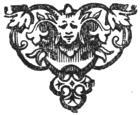
More on fairy tales and folklore in "Seven Miles of Steel Thistles" available here and here.
Picture credits:As I couldn't find any illustrations of this particular Hungarian tale, the one at the top of the post is from the fairy tale 'Mollie Whuppie' and it's by Errol le Cain.
Published on March 24, 2020 02:49
March 17, 2020
Fairy Tale Heroines #4: THE GROAC’H OF THE ISLE OF LOK
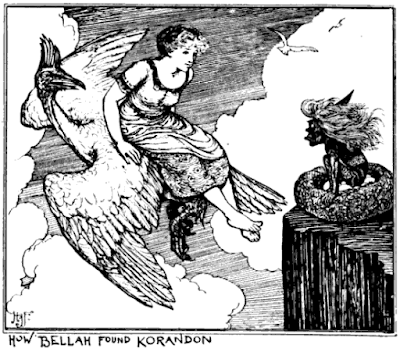
This lively fairy tale comes from Brittany (the Isle du Loch is a real island off the Brittany coast, and as the name suggests, it has a lake) and it's another traditional story in which a young man has to be rescued by his dauntless, magic-working sweetheart. The Groac’h of the title is a fairy enchantress, but a groac’h (Gaelic gruagach, Irish grogan) is a creature which turns up in many Celtic fairy tales. The word is sometimes claimed to mean ‘old woman’, but JG Campbell explains it literally as ‘the long-haired one’ and ‘a common Gaelic name for a maiden, a young woman.’ Emile Souvestre (see below) thinks the word once applied to druid priestesses on offshore holy islands: whether or not that is so, it must gradually have become a catch-all: some gruagachs seem to be the same creature as the glaistig, ‘a tutelary being haunting farms and stables’, who appears as a finely-dressed young man or woman with long hair. Others seem the equivalent of brownies or boggarts. In ‘A Dictionary of Fairies’, Katherine Briggs tells us that the grogan of the north of Ireland tends to follow the brownie tradition, while the groganof the south is more usually a supernatural wizard, and often a giant too, or a type of ogre.
"The Groac’h of the Isle of Lok" is included in ‘Le Foyer Breton’ by Emile Souvestre (1844) and he has almost certainly embellished the tale with a number of charming ‘literary’ descriptions – for which it is none the worse! Andrew Lang’s wife Leonora Blanche Alleyn translated it for ‘The Lilac Fairy Book’ (1910), but she cut out nearly all the Breton references, especially those to do with the Christian religion or Breton saints, while the korandon (a Breton folkloric creature also known as a korrigan) becomes a generic ‘little man’. Alleyn has also removed anything she felt unsuitable for children – such as a few mild sexual references and a moment when the hapless hero drinks far too much of the Groac’h’s wine. The effect is to make the tale blander, less risqué, and less funny. So this my own translation, slightly abbreviated, of Souvestre’s version.
In the days when miracles happened in Brittany even more often than christenings and funerals do today, there lived in the village of Lanillis a young man named Houarn Pogamm and a girl called Bellah Postik. They were cousins, and when they were in the cradle together, their mothers had hoped for them one day to marry, but since then their parents had died, and they’d had to hire themselves out as servants, so they were too poor to get married.
“If only we had a little cow, and a skinny pig to fatten up,” said Houarn. “I’d buy a bit of land, the curé could marry us and we’d live happily together.”
“Yes,” said Bellah with a sigh, “but these are hard times. Cows and pigs fetch high prices at the Ploudelmazeau market. God no longer seems to care what happens in the world.”
This made them both unhappy, and one day Houarn came to Bellah and told her he was going to go away and seek his fortune, so that he could come back and marry her.
Bellah begged him not to leave. But his mind was made up, so she said, “Go then, since you must, and may God protect you! But first I will divide with you what my parents left me,” and taking him to her room she opened a small chest and took out a bell, a knife and a wand.
“These relics,” said she, “are heirlooms which have never left my family. Here is the bell of Saint Kolédok; it can be heard at any distance, however far, and will ring to tell our friends if we’re in danger. This knife belonged to Saint Corentin and anything it touches will be freed from any enchantment. Last of all, this wand is the baton of Saint Vouga; it will carry the one who holds it wherever they want to go. I give you the knife to guard you against the spells of magicians or demons, and you shall have the bell to warn me of any dangers you meet, but I shall keep the wand so I can fly to your help if ever you need me.”
Houarn thanked her, they embraced and cried a little, and he set out. Along the way he came to a little town called Pont-aven, set on a river bordered with poplars. As he sat by the inn door, he overheard two men who were loading their mules talking about the Groac’h of the isle of Lok.
“Whatever is a Groac’h?” he asked, and the men told him it was the name of the fairy who lived in the lake on the Isle of Lok, and she was richer than all the kings of the world put together, and many men had journeyed there in search of her treasure, but not one had ever returned.
“I will go, and I will return too!” said Houarn. And although the men told him not to throw his life away, he went down to the sea and paid a boatman to carry him over to the isle of Lok.
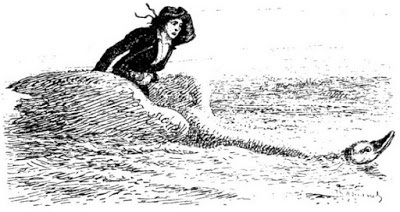
He found the lake without any trouble. It was in the middle of the island, surrounded by marshland. He walked around it till at one end he saw, in the shade of a clump of yellow broom, a little sea-blue boat shaped like a sleeping swan floating gently in the water with its head tucked under its wing. Houarn marvelled, and climbed on board to take a better look, but no sooner had he set foot on it than the swan woke. Its head came out of its feathers, its big feet struck the water and it paddled briskly away from the bank. The young man exclaimed in fright, but the swan sped towards the middle of the lake, and just he decided to jump overboard, the bird plunged its head into the water and dived, carrying him down with it. His cry was stifled, he had to shut his mouth so as not to swallow the muddy water, and soon he arrived at the Groac’h’s home.
The palace was made from shells of many colours. The approach was by a crystal stairway made so that each step, as you trod on it, chirped like a woodland bird. All around the palace were huge gardens, forests of marine plants and lawns of green weed strewn with diamonds instead of flowers. The Groac’h herself was resting on a golden couch in the first hall. Her face was as pink and white as the shells of her palace, her black hair fell to her feet, woven with strings of coral, and her sea-green dress flowed as she moved. Houarn was dazzled by her beauty.
The Groac’h rose smiling and came towards him as gracefully as a white wave passing across the sea. “Welcome,” she said. “There is always a place here for strangers, especially handsome boys. Tell me your name, and what you want.”
Houarn told the Groac’h who he was, and how he wished to make enough money to return to Lanillis, buy a cow and a little pig, and marry his sweetheart.
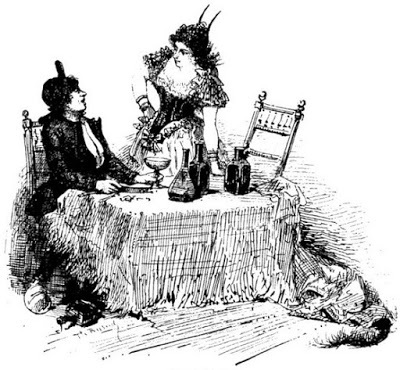
“That is easily done,” she answered. “Come now, drink with me!” And she led him into a second hall decorated with pearls and gave him eight different wines to try, served in eight silver goblets. The wine was so good that Huoarn drank all eight at once, and then he had eight more of each, and at each cup the Groac’h seemed to him more beautiful than before. And she encouraged him, teasing that he needn’t worry about impoverishing her, as the lake of the isle of Lok had an entrance to the sea, and all the rich treasures from all the shipwrecks were swept to her on a magic current.
“Upon my word!” cried Houarn – who was now very merry – “no wonder everyone speaks ill of you; rich people are always envied. As for me, I’d settle for a tiny fraction of your wealth!”
“You may have all of it if you wish,” said the Groac’h.
“How?”
“I’m a widow. My husband the korandon is dead, and if you would like me, I’ll marry you.”
He, Houarn? – to marry the beautiful Groac’h? – and live in this splendid palace? – and have eight varieties of wine he could drink at his will? It’s true he’d asked Bellah to marry him, but how easily men forget that kind of promise! He accepted with joy.
“Then let us perform the ceremony,” said the Groac’h, and she led him down to a little fish-tank at the bottom of her garden.
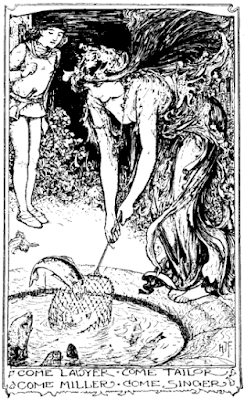
“Hey, attorney! Hey, miller! Hey, tailor! Hey, chorister!” she called, holding out a steel net. At each cry a fish jumped into the net , and when it was full she went into the kitchen and threw them all into a golden frying pan and started to fry them. But as the fat heated, Houarn seemed to hear little voices crying.
“Who’s crying in the golden frying pan?” he asked. “It’s only the fat spitting,” said she, but it didn’t sound like that to Houarn. “There it is again!” he cried.
“It’s just the fire-wood crackling,” she replied, but the noise grew louder, like little shrieks. Houarn became uneasy.
“What can it be?” he exclaimed, but the Groac’h said, “It’s nothing but the cricket chirping on the hearth.” And she began to sing so loudly he could hear nothing more. But all of this was causing Houarn to think again. He was becoming frightened, and he began to feel remorseful.
“Jesu and Mary!” he thought, “how is it possible I could have forgotten Bellah for the sake of a Groac’h who is quite possibly the daughter of the devil? How could I say my evening prayers while living with a woman like that? I’d be sure to go to hell!” But while he was having these thoughts, the Groac’h finished frying, and she set the pan in front of him and told him to eat, while she went to the cellar to find him a dozen more wines.
Houarn sat down and took out the knife Bellah had given him, but as soon as the blade touched the fish they turned into little men, each dressed according to his station – an attorney in his robes, a tailor in purple stockings, a miller covered in flour and a chorister in his surplice – and they cried together as they swam in the hot fat, “Save us, if you yourself hope to be saved!”
“Holy Virgin! What are these little fellows doing, singing out in the melted butter?” young Houarn gasped.
“We are Christian men like you! Like you we came to the isle of Lok to seek our fortunes, and like you we agreed to marry the Groac’h, but the morning after the marriage she turned each of us into fishes as she’s done to many men before, and now we all swim in the fish-tank together!”
“No! How can she look so young, if she’s already been married to all those fishes?”
“She's a fairy! And the same will happen to you – caught and fried, and served to the next comer!”
Houarn jumped up as if he was already sizzling in the gold frying pan. He rushed for the door, but the Groac’h was on the threshold and had heard everything. She threw the steel net over his head, turned him into a little green frog and took him down to the fish-tank to join all her other husbands.
At that very moment, the little bell which Huoarn wore around his neck rang by itself, and Bellah head it in Lanillis, where she was skimming cream in the dairy. “Houarn’s in danger!”
Without waiting for anything or speaking to anyone, she ran to put on her Sunday clothes and slippers, and her silver cross, and left the farm with her magic wand. Coming to the cross-roads she drove the wand into the earth, murmuring:
Apple-wood wand, carry meOn earth or wind or water:In the name of St Vouga, bear meWherever I want to go.
At once the stick turned into a little red horse of St Thégonec all nicely combed, saddled and bridled, with a rosette at each ear and a blue feather on his forehead. Bellah leaped on his back and he set off at a walk, a trot, a canter, faster and faster till ditches, trees, houses and bell-towers flew by like a whirling wheel. But he wasn’t fast enough for Bellah, so she bent to his ear and said, “A swallow is swifter than a horse, the wind is swifter than the swallow, the lightning is swifter than the wind, but you my little horse must gallop faster than all of them, so I may rescue my love.” And the horse now galloped like a straw blown by a hurricane till they reached the foot of a rock called the Deer’s Leap. There he stopped, for neither horse or mule could climb it and Bellah knew this, so she sang,
Little red horse, now carry me On earth or wind or water,In the name of St Thégonec, bear meWherever I wish to be!
As soon as she had finished, wings sprouted from the horse’s sides and he turned into a great bird which carried her easily to the summit of the rock. Here at the top she found a nest made of clay and line with dried moss, and in the middle of the nest was a tiny little korandon, all black and wrinkled, who cried out,
“Here’s the pretty girl who has come to save me!”
“Save you! Who are you, my little man?”
“I am Jeannik the korandon, husband of the Groac’h of the isle of Lok, and she has imprisoned me here!”
“But what are you doing in this nest?”
“I’m sitting on six stone eggs, and I can’t be set free till they have hatched.”
Bellah could not help laughing. “Poor little cockerel!” she said, “and how am I to save you?”
“By saving Houarn, who is in the power of the Groac’h!”
“Ah! Tell me how and I will do it, even if I have to crawl on my knees around around four bishoprics!”
“You must disguise yourself as a young man and go to find the Groac’h. Then you must take the steel net that hangs from her waist, and shut her up in it for ever.”
“How can I find a set of boy’s clothes?”
“I shall manage that.” And pulling four red hairs from his head, the korandon blew upon them and changed them in the twinkling of an eye to four tailors. The first carried a cabbage, the second a pair of scissors, the third a needle and the fourth an iron. They sat cross-legged in the nest and made a suit of clothes for Bellah with the cabbage leaves as cloth, and when she was dressed she looked like a handsome young man dressed in in green velvet lined with white satin. She thanked the little mannikin, jumped on the back of her bird and flew away to the isle of Lok, where the bird changed back into a wand, and the blue swan-boat carried her to the Groac’h’s palace.
“By my cousin the Devil,” said Groac’h to herself when she set eyes on this new visitor, “here is the handsomest young man I’ve ever seen in my life. I could make love to him three times a day for three days!” and plying Bellah with endearments she led her through the great hall where the wine cups stood and fruit lay piled on the table… and the young woman spied the knife of Saint Corentin, which Houarn had dropped. She hid it her pocket to use later, and followed her fairy hostess into the garden. The Groac’h showed her the diamond flowerbeds, the perfumed fountains and the fish-tank, where rainbow-coloured fish swam in their hundreds.
Bellah pretended to be enchanted with these. She stood at the edge of the water gazing as they flashed and twirled.
“How would you like to stay here and watch them for ever?” asked the Groac’h, and Bellah replied that she would like nothing better.
“So you shall, if you will marry me here and now!” cried the Groac’h.
“Yes,” said Bellah, laughing, “but first you must lend me your net and allow me to try and catch one of these lovely fishes.”
“Take it, my beautiful fisherman,” said the Groac’h, “let me see what you can catch!”
“I’ve caught the devil!” cried Bellah, casting the net over the Groac’h’s head, “In the name of the Saviour, become in body what you are in soul!” and instantly the lovely fairy of the sea was changed into a hideous toad. Bellah pulled the net tight and ran to fling it into a pit, over which she rolled a stone sealed with the sign of the cross, so the Groac’h could never escape until Judgement Day.
Then she ran back to the pond, where a great procession of fishes greeted her like strange little monks, all of them croaking, “All hail to our lord and master who has saved us from the steel net and the gold frying pan!”
“And I am the one who will restore you to your proper shapes!” said Bellah. Drawing the magic knife from her pocket she was just about to transform the first ish, when her eye fell upon a small green frog. He crouched sobbing on the edge of the fish-tank, with the magic bell around his neck and his little hands placed over his heart.
“Is it you, my Houarn?” she cried. “Is it you?”
“It is,” croaked the little frog, and as the knife touched him he sprang up a man again, and they fell into each other’s arms.
Then Bellah began to transform all the fishes to their human shapes again. It took a long time, there were so many, and just as she finished who should arrive but the korandon from the Deer’s Leap Rock in a chariot pulled by six oak flies, June bugs as you might call them, which he had hatched from the six stone eggs.
“There you are, the pretty girl!” he called to Bellah. “You’ve broken the enchantment which held me and here I am to thank you – for out of a chicken you’ve made a man! Now for your reward,” and he led the two lovers to the Groac’h’s coffers, all stuffed with gold and jewels, and told them to help themselves. Bellah and Houarn filled their pockets, their belts, their hats and even their pantaloons, and when they had taken as much as they could carry, Bellah made her wand turn into a winged chariot big enough to carry not only themselves but all the men they had rescued back to Lanillis. There the banns were read, and Houarn married Bellah – only now, instead of a little cow and a skinny pig, they were rich enough to buy up all the land of the parish, and the men who had been fishes became their tenants, and they all lived happily to the ends of their days.
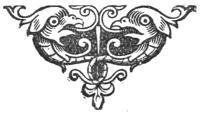
More on fairy tales and folklore in my book "Seven Miles of Steel Thistles" available from Amazon here and here.
Picture credits:
Bellah and Korandon by HJ Ford
The Swan-boat dives by Théophile Busnel
Houarn Enjoys the Groac'h's Wine by Théophile Busnel
The Groac'h calls the fishes into her net by HJ Ford
Published on March 17, 2020 05:22



